
Travel agencies and tour operators both are necessary for the travel industry. But sometimes the question arises re their actual definition.
How are they different?
If you’re often confused by the difference between a travel agency and a tour operator, we’re going to discuss these two roles, and outline the significant differences between them.
They’re often connected, but are not the same.

The Difference Between a Travel Agency and a Tour Operator
Travel agency.
A travel agency is a company who plans, arranges, books, and makes the necessary arrangements for travellers. They sell flights, accommodation and tours, and package them together for travels who don’t wish to book themselves.
Worth noting that there are now many independent travel agents, who take on this role without being connected to an agency, and this can be a great travel industry job for people who want to work remotely.
There are several types of travel agents. Some put together itineraries from scratch for their clients while others work for specific travel companies, and some are mere resellers of pre-packaged tours on behalf of Host Agencies.
However most will help you plan your trip, and make suggestions based on your interests, your budget , and your travel requirements, the benefit here being that they’re experts in booking travel, and know the best tricks for planning and booking a holiday.
Pro tip: An MLM scheme can usually be identified when there is a set-up cost involved in working for the company as an agent. You shouldn’t have to pay to work for someone.
Travel agents are professionals – in many countries agencies need a travel agency license , meaning they are qualified and licensed to book trips on behalf of other people.
The way they make money is through access to industry discounts from companies they work with, which allows them to add a markup / commission to make money without charging more to the traveler.
Tour Operators
A tour operator is someone who organizes, prepares and runs a holiday tour. If you book a tour which includes accommodation, transport, breakfast, tour guides, and sightseeing etc, this is organized by the operator.
Essentially, they sell a product that they themselves create. They work with suppliers to create a packaged tour which they put their own price tag on, and can be booked by travel agents for their clients, or by the traveler directly.
They do not sell anybody else’s packages (which travel agents do), they only organize and sell their own tours.
Just as there are many different types of agents, there also are many different types of tour operators , including inbound tour operators, outbound tour operators, domestic tour operators, and ground tour operators.
Though even inbound and outbound tour operators, who bring tourists to a country and handle all the arrangements in that country, will hire local travel agents to book in things like airport transfers, and maybe even hire ground tour operators for the tour itself.
With advances in technology, many travelers now book their packages directly with the tour operators rather than going to a travel agent, where-as in the past travel agencies were often the only option for connecting with a tour.
Key Differences Between Travel Agencies and Tour Operators
➤ Travel agents sell the holiday package purchased from different tour operators. Tour operators take care of the clients according to the package description like airport pick up, meal facilities, sightseeing, offering other travel destinations, etc.
➤ Tour operators are often specialized in one, or very few countries. But travel agents can deal with most destinations.
➤ A travel agent earns less profit, usually a small mark up or commission based on the travel they’re booking. Tour operators have the potential to earn a huge profit, as they set their own price tag.
➤ Travel agents can’t work without the help of tour operators. But tour operators can work without a travel agency being that people are now more likely to contact tour operators directly for a holiday package.
➤ There are different kinds of training programs available to start a travel agency. In comparison, the tour operator requires proper business management skills.
If You Liked This Post You May Also Like:
Keep Your Passport Safe While Traveling
How to Plan a Trip to Europe – No Travel Agent Required
Things You’ll Need When Applying for a Visa

Megan is an Australian Journalist and award-winning travel writer who has been blogging since 2007. Her husband Mike is the American naturalist and wildlife photographer behind Waking Up Wild ; an online magazine dedicated to opening your eyes to the wonders of the wild & natural world.
Having visited 100+ countries across all seven continents, Megan’s travels focus on cultural immersion, authentic discovery and incredible journeys. She has a strong passion for ecotourism, and aims to promote responsible travel experiences.
Great information on Travel Agency and Tour Agent.
Glad the post was helpful for you Bella, thanks for reading :)
Thanks so much.it was helpful
You’re welcome! Thanks for reading :)
Thank you Megan,
We are a small family tour operator here in Tasmania. Specializing in small private experiences, with great guest focus, attention to interests and needs. Delivering balance of Tassie wild, depth in past and present with a side order of creative local produce.
We small and passioante operators need to support each other.
Great to connect with you Ben! Weve recently moved from Tasmania to Cairns, but Tassie will always be home :)
Post a Reply Cancel reply
Your email address will not be published. Required fields are marked *
Save my name, email, and website in this browser for the next time I comment.
Search This Site

I am Megan Jerrard, professional travel blogger/journalist with a focus on adventure, discovery, immersion and inspiring you to explore!

Recent Posts
- Top 5 Campervan Destinations to Visit Near Christchurch
- Toronto’s Hidden Gems: Discovering Secluded Spots on a Yacht Charter
- How to Stay Entertained When on a Long Flight
- 8 Essential Financial Tips for Solo Female Travelers
- How Travel Improves Mental Health for Solo Adventurers
Popular posts
- International Love: Maintaining a Long Distance Relationship
- Illegal Ink – 11 Countries Where Showing Your Tattoos Could Get You Kicked Out!
- 7 Things To Know Before Travelling by Overnight Train in Vietnam
- A Travelers Guide to Tap Water: Countries Where The Drinking Water is Unsafe
- Countries That Don’t Celebrate Christmas
Understanding the Difference Between Tour Operators and Travel Agents

By Rebecca Somes

Tour operators and travel agents might seem similar at first glance, but they have distinct roles when it comes to planning a vacation. While they both offer some similar services, it’s helpful to know which one best fits certain needs.
What is a Tour Operator?
A tour operator handles the nitty-gritty of a holiday experience, from booking and packaging to organising accommodation, transport, meals, guides, and optional tours. They’re like the behind-the-scenes magicians who ensure everything runs smoothly once a customer steps off the plane at a destination
On the other hand, travel agents act as matchmakers, connecting customers with the perfect vacation package from various tour operators. They’re like personal travel advisors, helping navigate through different destinations, budgets, and travel preferences to find the ideal fit for a dream getaway. Once customers have made a choice, they liaise with the tour operator to ensure all requests are met, handling the paperwork and payments along the way.
In the past, travel agents were the go-to choice for booking tour packages. However, with the rise of the internet and travel technology over the last couple of decades, many people now opt to book directly with tour operators. The internet has made it easier than ever to access and book tour packages independently, reducing the need for an agent to identify available operators. Nowadays, most tour operators engage directly with clients and sell their packages, cutting out the middleman.
However, some people still prefer to rely on their trusted local or family travel agent, with whom they have built a long-standing relationship over the years.
Types of Travel Agency

In the travel industry, there’s a growing number of independent travel agents who operate without ties to a specific agency. This presents a fantastic opportunity for people looking for remote work in the travel sector.
These independent agents come in various forms. Some create bespoke itineraries tailored to each client’s preferences, while others partner with specific travel companies. Additionally, some act as resellers, offering pre-packaged tours through Host Agencies.
Regardless of their specific model, most travel agents excel at helping to plan a trip. They use their expertise to provide recommendations based on their customer’s interests, budgets, and travel requirements. The advantage of working with a travel agent lies in their insider knowledge and knack for navigating the complexities of holiday planning and booking. When it comes to travel agencies, there’s a varied range of options available to suit every preference. Here are some of the different types of travel agencies:
Online Travel Agencies (OTAs): These are websites that allow users to search and book travel-related services online. OTAs offer a wide range of options, from flights and cruises to tours and activities, all in one convenient platform.
Brick-and-Mortar Travel Agencies: These are traditional travel agencies with physical offices where customers can visit and speak with travel agents face-to-face. They provide personalized service and assistance in planning and booking travel arrangements.
Corporate Travel Agencies: Specializing in business travel, corporate travel agencies cater to the needs of companies and organizations. They manage corporate travel policies, negotiate discounts with suppliers, and help with itinerary planning and expense management.
Specialist Travel Agencies: These agencies focus on specific types of travel, such as adventure travel, luxury travel, or niche markets like eco-tourism or culinary tours. They offer expertise and tailored recommendations for travellers with particular interests or preferences.
Overall, the travel agency landscape is diverse and caters to a wide range of travellers, each with unique needs and preferences.
The Roles of Tour Operators and Travel Agents
In conclusion, while tour operators and travel agents share some similarities, they play distinct roles in the holiday planning process. Tour operators handle the logistics of a vacation, from booking and packaging to on-the-ground arrangements, ensuring a hassle free experience for travellers. On the other hand, travel agents act as intermediaries, connecting customers with the perfect holiday package from various tour operators, and offering personalized advice and assistance throughout the planning process. Despite the rise of online booking platforms and websites , many travellers still rely on trusted travel agents for their expertise and insider knowledge. Additionally, the travel agency landscape continues to evolve, with independent agents offering bespoke services and various types of agencies catering to different travel needs and preferences. Ultimately, whether booking through a tour operator or a travel agent, travellers have access to a diverse range of options to suit their individual preferences and requirements thanks to the advancements in travel technology and products .
What is an Automated Travel System?
The future of travel agents explained.
- Why Choose Us
- Terms of Service
- Cookie Policy
Travel Technology Products
- AgentConnect
- CruiseConnect
- iBos – Administration
- iSell – Search & Book
- TourTek – Tour Packaging
Travel Software Solutions
- Cruise Booking Engine
- Dynamic Packaging
- Data Warehouse Reporting
- RPA – Automation
- Travel Agent White Label Solutions
- Tour Operator Software
- Travel App Development
- Travel Agency Web Design & Development
- Travel API Provider
- Travel API – 300+ Suppliers
- Tour Operator API
- Payment Gateway API
- Flight Airline API
- Cruise Websites
- Meet the Team
Core Differences
We Provide Comparison for All Terms
10 Difference between Tour Operator and Travel Agent (With Table)
Technological advancement has made traveling around the world easier. But a lot of people have lost thousands of dollars when trying to book holiday packages online.
Travel industries have tried to get rid of these misconceptions by introducing tour operators and travel agents. The purpose is to protect travelers from scammers in the online travel industry.
Many people usually find tour operator and travel agent terms quite confusing. This industry jargon may sound the same but that is not true in real life.
So, what is the main difference between tour operator and travel agent? The former is the company or an individual responsible for planning the trip while the latter is the broker or intermediary selling the tour package.
The relationship between the travel agent and tour operator can be confusing for first-time travelers. Understanding the definition of travel agent and tour operator is crucial in this case.
This article provides insight into the differences between tour operators and travel agencies in a tabular form. Take the time also to read the similarities between tour operators and travel agents.
You May Also Like: Difference between Washington and Washington DC
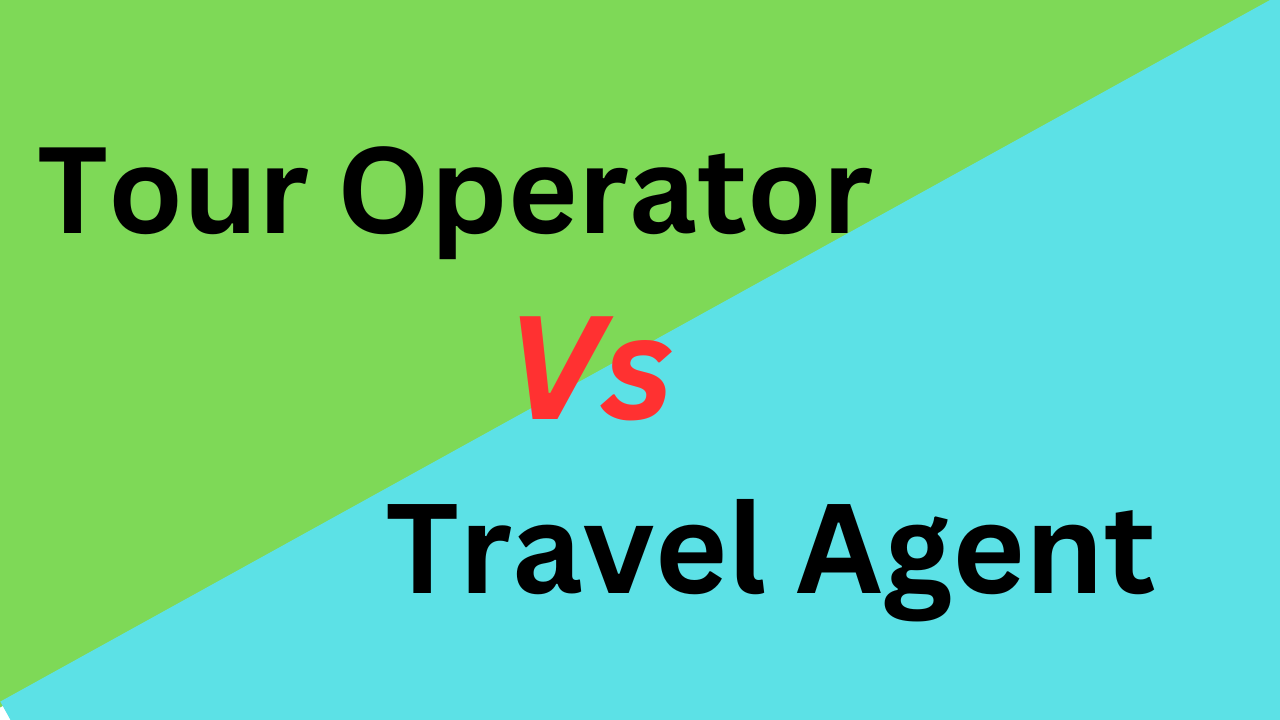
Comparison Table (Tour Operator vs Travel Agent)
Who is a tour operator.
A tour operator is a person or company responsible for planning, arranging, advertising, and creating trips or tours packages for clients.
Tour operators are responsible for creating holiday packages such as accommodation, airport pick-ups, activities, and trips.
The trips usually take place through an intermediary or directly. These two channels are ways how the tour operators make sales in the travel industry.
Inbound tour operators are those companies that receive guests and handle all arrangements within the host country (responsible for community-based tourism experience).
Outbound tour operators promote foreign destinations while domestic tour operators offer travel services to domestic travelers (service may not be taking place entirely in the country).
Ground tour operators are locally based and usually work in close association with other travel businesses. The operators do not sell transportation and guidance services individually.
Who Is a Travel Agent?
A travel agent is a person who sells and administrates holiday packages to tourists. These individuals help tourists narrow down their searches and recommend the best travel packages.
Travel agency works with several tour operators and earns a commission after the tourist has made a booking with the desired tour operator.
Travel agents offer tourists different experiences depending on their needs. Travel agencies are responsible for promoting tourism in a particular country or destination.
The travel agency is responsible for processing and packaging all the attraction, amenities, and ancillary services.
Travel agents work directly with tour operators and they provide transportation, accommodations, and trip packages.
Main Difference between Tour Operator and Travel Agent
- Tour operators create holiday packages, sell, advertise and plan. Travel agents sell and administrate tour packages.
- Tour operators deal with finer details such as accommodation, tickets, and meals. Travel agents help tourists to choose a suitable package.
- Tour operators offer advice on legalities on the ground while travel agents offer advice on travel documents such as passports or visas
- Tour operators’ job ends when the client returns home after vacation while travel agents job end when the client makes a booking for vacation.
- Tour operators earn huge profits since they set trip fees while travel agents earn commission from the bookings made by the client.
Similarities between Tour Operator and Travel Agent
- Both belong in the travel industry
- Both help tourists fulfill their holiday experiences
- Both have information about various destinations.
- Both promote tourism in various destinations.
Frequently Asked Questions
Is a Tour Operator an Agent?
Not really. An agent sells the holiday packages bought from a tour operator. The tour operator takes care of the tourist according to the holiday package description.
Difference between Travel Agency and Tour Operators
Travel agencies sell attractive tour packages to people interested in holiday vacations. Tour operators are responsible for creating holiday packages and broke them to travel agencies.
Difference between Wholesale Travel Agency and Tour Operator
A wholesale travel agency deals with one component of travel product whereas a tour operator deals with a variety of tour programs. Besides that, a wholesale travel agency does not sell directly to the public and a tour operator does sell directly to the client.
In Conclusion
The core difference between a tour operator and a travel agent is that a tour operator creates the holiday packages while a travel agent is responsible for selling and administering the holiday packages to clients interested in the vacation.
Do not allow the close relationship between travel agents and tour operators to confuse you. I hope this article was helpful in telling the difference between travel agency and tour operator.
You May Also Like:
- Difference between 2 Star Hotel and 3 Star Hotel
- Difference between 3 Star and 4 Star Hotels
- Difference between First Class and Business Class
- Difference between Expressway and Freeway
More Sources and References
- https://tourismnotes.com/tour-operators/
- https://link.springer.com/referenceworkentry/10.1007%2F978-3-319-01669-6_206-1
- https://www.researchgate.net/publication/315768436_THE_TOURISM_INTERMEDIATION_SYSTEM_THE_RELATIONSHIP_BETWEEN_TRAVEL_AGENCIES_AND_TOUR_OPERATORS
Leave a Comment Cancel reply
Save my name, email, and website in this browser for the next time I comment.
The Difference Between Tour Operators & Travel Agents

28 Sep 2023 Quite a common question for anyone not working in the travel industry is about the difference between a tour operator and a travel agent. Both terms are, in effect, industry jargon and we expect the consumer to work out what the difference is. So let's clear that up. What Is a Tour Operator? A tour operator is a person or company that thinks up ideas for holidays, researches the ideas, designs the holiday itinerary and content, contracts the services needed for the holiday, accommodation, transport, guides, tour leaders or resort reps and then markets the resultant package. They sell the package either directly to the consumer or use the services of a travel agent to do so. A tour operator sells the product that they themselves create. They do not sell anybody else's packages, they sell only their own creations. A tour operator is what in law is referred to as a "principal", meaning they take responsibility for the package that they create and cover that liability with (usually) an ATOL licence and / or some form of bonding to ensure that the consumer gets their money back if the tour operator fails, or is flown home if they are abroad when a tour operator fails. It's worth mentioning that, with regard to bonding for financial protection, the law asks that certain items or services must be bonded; AITO demands that all its tour operators bond anything they sell to the consumer; this is in excess of what the law demands, to the benefit of the consumer. Who does a Travel Agent Differ? On the other hand, a travel agent offers the consumer a range of holiday packages that have been put together by a tour operator. They do not, in theory, put together any of their own packages; they sell lots of different holidays put together by lots of different tour operators. They do not usually design or create the holidays they sell, and they do not act as a Principal. The tour operator whose product they sell takes the responsibility for the holiday; the travel agent does not. Therefore the agent usually does not have an ATOL licence or any bonding in place, but relies on the tour operator to cover this. Nowadays it is fair to say, the difference between tour operator and travel agent is blurred. Some travel agents do create some packages, and therefore do act as a Principal and have the required licences, but they will also sell other product put together by tour operators. A good analogy goes like this: if you want to buy a dining room table and chairs, you have two choices. You can go directly to the factory where one particular company makes the table and chairs and buy from the creator of the product. But you will only, at that factory, see furniture made by that one manufacturer. If you go to a high street store and browse their furniture department, you can choose from a range of furniture made by several different furniture makers, but none of the furniture has been made by the high street retail store. In travel, the manufacturer, the factory, is the tour operator. The high street retail store is the travel agent. It's up to you whether you prefer to (a) talk to the creator or the product, or (b) have a wide range of product from different manufacturers to choose from. Why Book With a Tour Operator or Travel Agent? Another common question is why a potential traveller should book their holiday arrangements with a tour operator rather than doing it themselves. The answer to this question covers tour operators and travel agents - both are offering commercially assembled holidays. It is possible to spend hours researching a possible destination, pondering over the best itinerary, checking for the best hotels and so on. Or you can book with a tour operator who has done all that research and chosen wisely based on their experience and knowledge. If you design your own itinerary it can be fun, but if something goes wrong then you are on your own. A tour operator has a legal responsibility to look after you if things go awry. Strikes, natural disasters, personal illness and several other disasters can befall the traveller, better to have someone to take care of things at such critical times. If your overseas hotel ceases trading when you are there, or on your way there, you are on your own; whereas a tour operator will make alternative arrangements. When the Tsunami struck in Thailand some years ago, all the clients who had booked with a tour operator were helped by their tour operator; they were moved to alternative accommodation or flown home. Travellers who had booked their own arrangements were left to fend for themselves. "It's always the individual travellers who we can't locate and help", said someone at the Foreign Office Travel Unit, "since they don't tell us where they are going". If you want to assemble that dining room table and chairs yourself it's perfectly possible to buy some wood or other, practice a bit with a saw and then start creating your furniture masterpiece (have some bandages and some glue handy just in case). Or you can go to a furniture factory or retail shop and buy a carefully crafted piece of furniture. Most people do the latter when it comes to furniture - why be any less careful when it comes to making travel arrangements? Make it yourself or buy from a professional - it's your choice. What is the Role of AITO? A third question is why look at AITO for holiday ideas and help? Imagine if you could get over 100 tour operators all in one place, each with their own special holidays. Imagine if each operator had specialist knowledge about one particular destination or style of holiday. And imagine if each of the tour operators was independently owned. That is, each was run by the people who own it and who are passionate about what they sell. If you actually want all that, visit aito.com and it's all here in one place.
- Destination Travel
- Special Interest Travel
- Travel Advice
- Travel Tales
Popular Posts

Quite a common question for anyone not working in the travel industry is about the difference between a tour operator and a travel agent. Both terms are, in effect, industry jargon and we expect the consumer to work out what the difference is. So let's clear that up.
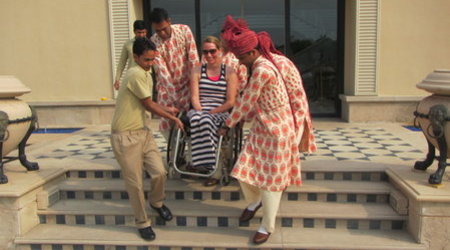
Accessible India: Where There’s Magic Around Every Corner
Lynne Kirby shares her experiences of exploring the Golden Triangle of India.

Walking Holidays: Free Your Mind
Steve Jack explains how a walking holiday can be good for body, mind, and soul.
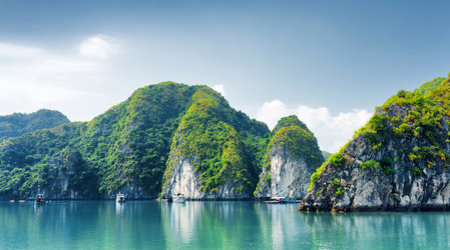
Tips for Your First Trip to Vietnam
Are you thinking of going to Vietnam? If so, here are a few top tips, and FAQ's, answered. How do I get a Visa? What's the weather like? How do I behave and dress?

The Vistula District
The Vistula river has beaches, boulevards, and an active nightlife surrounding it.
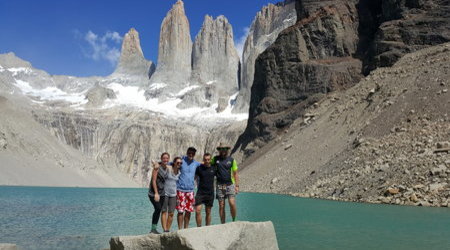
What is Overlanding?
You might've heard of the term 'overlanding' on the television, in an article, or popping up on Facebook. But what exactly is it? We have the answer for you.
Please enter your username and password to logon to the member pages
By clicking the box above, you agree that a cookie will be placed in your browser to retain your login details Forgotten password?
Tour Operator vs. Travel Agent – Which One Do You Need?
Are you planning a trip but confused about whether you need a tour operator or a travel agent? Understanding the difference between these two travel professionals is crucial to ensure you get the right assistance for your journey. While both tour operators and travel agents are involved in organizing trips, they serve distinct purposes. A tour operator typically designs and conducts tours, handling all the logistics and on-site arrangements, while a travel agent specializes in assisting clients with booking accommodations, transportation, and other travel-related services.
In this blog, we will delve deeper into the distinctions between tour operators and travel agents to help you determine which one best suits your travel needs.

Understanding the Roles
When planning a vacation, understanding the roles of a tour operator and a travel agent is crucial. Both professionals play distinct yet interconnected roles in the travel industry. Tour operators design and organize tours, ensuring a seamless and enriching experience for travelers. On the other hand, travel agents help clients book flights, accommodations, and other travel services. Knowing the difference between the two can help you choose the right expert for your travel needs.
The Role of a Tour Operator
Tour operators are responsible for crafting detailed itineraries, arranging transportation, accommodations, and tour guides, and coordinating all aspects of a trip. They often work directly with destinations and accommodations to secure the best rates and experiences for travelers.
The Role of a Travel Agent
Travel agents serve as intermediaries between travelers and service providers. They help clients navigate through the myriad of travel options, recommend destinations, book flights, accommodations, and activities, and provide valuable advice based on their expertise and knowledge of the industry.

Differences in Services Offered
When considering the difference between a tour operator and a travel agent, one key aspect to focus on is the range of services they provide.
Customization and Planning
Travel agents primarily assist in booking flights, hotels, and other accommodations. They provide guidance on destinations and help in arranging the logistics of a trip.
On the other hand, tour operators offer pre-designed travel packages, including guided tours, activities, and accommodations, making the planning process simpler for travelers.
Local Expertise and Support
Tour operators have in-depth knowledge of specific destinations and can provide personalized recommendations based on local insights.
Travel agents focus more on logistical support, such as visa applications and transportation bookings, but may not offer the same level of destination-specific expertise as tour operators.
Booking Process Comparison
When deciding between a tour operator and a travel agent, understanding their booking processes is essential. Both play distinct roles in planning your trip, so let’s compare how each one handles booking arrangements.
Tour Operator Booking Process
A tour operator typically offers pre-packaged trips with set itineraries and fixed dates. Once you select a tour, you’ll make a booking directly with the operator or through a travel agency. They manage all travel logistics, accommodations, and activities during the trip.
Travel Agent Booking Process
On the other hand, a travel agent focuses on customizing trips based on your preferences. They assist in selecting destinations, booking flights, accommodations, and activities. Travel agents act as intermediaries between you and various service providers, providing a personalized experience.
Cost Comparison
When deciding between a tour operator and a travel agent, one crucial factor to consider is the cost. Tour operators often offer package deals that include accommodations, meals, and activities, providing a convenient all-in-one solution. While travel agents can also help plan trips, they may charge fees for their services on top of booking costs.
Package Deals vs. Customized Itineraries
Tour operators typically offer fixed-price package deals , making budgeting easier for travelers. On the other hand, travel agents can customize trips to meet specific preferences, but this personalized service may come at a higher cost.
Additional Fees and Commissions
Travel agents may charge consultation or planning fees, which can increase the overall trip cost. Tour operators often earn commissions from partner companies but may provide transparent pricing without hidden fees.
- Travel Agent: May charge consultation fees.
- Tour Operator: Commissions may be included in package prices.
Customer Support and Assistance
When deciding between a tour operator and a travel agent, one crucial factor to consider is customer support and assistance . Both tour operators and travel agents offer varying levels of support to travelers throughout their journey. Tour operators typically provide dedicated assistance from booking to the end of the tour, ensuring a seamless experience.
24/7 Support Hotline
One of the key features of a reliable tour operator is a 24/7 support hotline that travelers can contact in case of emergencies or queries. Having direct access to assistance can ease travelers’ concerns and enhance their overall experience.
Personalized Assistance
Travelers often appreciate personalized assistance provided by tour operators, where their specific needs and preferences are catered to. Whether it’s dietary restrictions, special accommodations, or itinerary changes, tour operators go the extra mile to ensure customer satisfaction.
Choosing the Right Option for Your Needs
When deciding between a tour operator and a travel agent, it is essential to assess your specific requirements to make the best choice for your travel plans. Understanding the difference between these two entities will help you determine which one aligns more closely with your preferences and needs.
Determining Your Travel Preferences
Before making a decision, consider whether you prefer pre-packaged tours (tour operator) or customized itineraries (travel agent). Customization may be a crucial factor if you have specific destinations or activities in mind.
Expertise and Destination Knowledge
One key factor to consider is the destination knowledge of the tour operator or travel agent you choose. A tour operator might specialize in certain regions or types of tours, while a travel agent can provide broader options across various destinations.
Frequently Asked Questions
What is the difference between a tour operator and a travel agent.
A tour operator typically organizes and arranges tours, activities, and accommodations for travelers, while a travel agent assists individuals in booking travel arrangements such as flights, hotels, and car rentals.
When should I consult a tour operator?
You should consult a tour operator when you are looking for pre-packaged tours or customized itineraries that include various activities and accommodations for a seamless travel experience.
Why would I need a travel agent?
You may need a travel agent to help you with booking flights, accommodations, transportation, and other travel-related services, especially if you prefer personalized assistance and recommendations.
Can a tour operator also act as a travel agent?
Yes, some tour operators may also offer travel agency services to assist customers with booking individual travel components such as flights and accommodations.
How do I choose between a tour operator and a travel agent?
Your choice between a tour operator and a travel agent will depend on your travel needs. If you want a fully planned itinerary with activities included, a tour operator might be more suitable. If you prefer flexibility in your travel arrangements, a travel agent could be the better option.
Final Thoughts
After exploring the nuances between tour operators and travel agents, it’s evident that each plays a distinct role in crafting memorable travel experiences. Tour operators excel in designing comprehensive packages, offering unique experiences, and ensuring seamless logistics, while travel agents provide personalized guidance, booking services, and valuable insights.
When deciding between the two, consider your travel needs – if you seek an all-inclusive itinerary with detailed planning, a tour operator could be ideal. On the other hand, for customized trips or individual booking assistance, a travel agent might be more suited to your requirements.
Ultimately, both professionals are valuable resources in the travel industry, and knowing the difference empowers you to make informed choices for your next adventure.
Related Posts
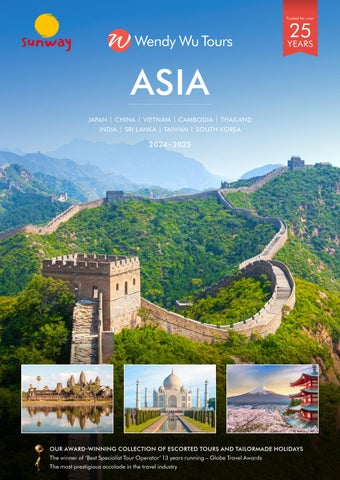
Farewell Festival 2025: Unforgettable Memories Await

Folk Festival 2025: An Unforgettable Celebration
Leave a comment cancel reply.
You must be logged in to post a comment.
Tours , Travel Tips
Understanding the difference between tour operator and travel agencies: a comprehensive guide.
- October 15, 2023
- No Comments
The travel industry is a huge and complex network of companies that each play a unique role in meeting the constantly changing requirements of tourists. Travel agencies and tour operators are two major participants in this market. Despite their frequent interchangeability, they have distinct roles, duties, and effects on your trip. In order to help you make wise choices the next time you embark on a journey, this book seeks to make those distinctions clear.
Overview of the Travel Sector Environment
Prior to getting too technical, it’s important to comprehend the overall travel business scenario. It includes travel agencies, hotels, rental car agencies, tour operators, and airlines, among others. Everybody has a specialty and works together to provide passengers with a smooth experience. Although they serve different purposes, tour operators and travel companies in particular serve as a middleman between the tourist and other service providers.
What is a Tour Operator?
A tour operator is a business or a person who designs and plans package vacations. These packages often include a variety of travel-related services, such as lodging, transportation, sightseeing, and occasionally meals, into a single item. These packages are created by tour operators using their knowledge, research, and connections to other service providers.
Key Functions of a Tour Operator
1. package creation.
They create distinctive travel packages for a variety of passenger types, including families, couples, and adventure seekers.
2. Coordination with Service Providers
To deliver a seamless travel experience, tour operators communicate with lodging establishments, transportation providers, and local guides.
3. Bulk Booking
They frequently reserve services in large quantities to get lower costs that they can then pass along to the client.
4. Quality Control
Monitoring lodging, transit, and other services on a regular basis to ensure that they meet quality standards.
What is a Travel Agency?
A company that represents passengers as an agent is known as a travel agency. They handle and market travel-related goods and services, ranging from hotel reservations and airline tickets to whole vacation packages (which are occasionally obtained through tour operators).
Key Functions of a Travel Agency
1. booking services.
They assist clients in making reservations for buses, trains, airplanes, and other forms of transportation.
2. Accommodation
Travel agencies have the ability to reserve hotels, resorts, or other types of lodging for their clients.
3. Itinerary Planning
While not as comprehensive as tour packages, they can assist in organizing an itinerary according to the requirements of a visitor.
4. Providing Insurance and Other Services
A lot of organizations provide currency exchange, travel insurance, help with visas, and other services.
Key Distinctions Between Travel Agencies and Tour Operators
1. the type of service.
Travel agencies mostly offer individual services or serve as sales representatives for travel items, whereas tour operators concentrate on the entire experience by designing multi-day vacation packages.
Tour operators engage directly with service providers like hotels and airlines, operating on a greater scale. Conversely, travel agencies may have closer relationships with certain clients.
Tour operators may provide better packages because of their direct relationships and large booking volume. Although they could provide more alternatives, travel agencies might not have the same pricing advantage for packages.
4. Expertise
Tour operators may create more personalized packages since they frequently have extensive understanding of particular trip locations or itineraries. While their expertise may be more general, travel companies may not have a focus on a particular area.
Which One Is Better to Select?
Your choice between a travel agency and a tour operator primarily comes down to the type of trip you’re looking for.
- In Search of Tailored, Stress-Free Experiences: A tour operator that specializes in these areas could be a better option if you’re searching for a more specialized experience, like a safari in Africa or hiking in the Himalayas.
- For freedom and Variety: A travel agency can provide you the necessary freedom if you would rather plan your own itinerary and choose specific components such as hotels, airlines, and excursions.
The Development of Travel Agencies and Tour Operators
In the past, there was a clearer distinction between the functions of travel agents and tour operators. Travel agencies served as middlemen in the early stages of contemporary tourism, mainly handling bookings and ticket sales. On the other hand, tour operators arose alongside the popularity of package vacations, particularly following World War II when leisure travel took off.
However, both groups have had to adjust because to changes in passenger behavior and technology improvements. Their operations have been changed with the introduction of internet booking platforms and direct-to-consumer marketing tactics. These days, a lot of travel companies sell package packages, and tour operators offer individual services, so the roles they play are pretty much interchangeable. However, there is still a fundamental distinction between their respective roles.
The Industry’s Reaction to Digital
Travelers have access to more resources than ever before in the digital era. Travel packages, lodging, and even flights may be booked instantly using websites, applications, and online platforms. The transition to digitalization has affected travel agents as well as tour operators.
These days, tour operators may reach out to customers directly through their websites, blogs, and social media accounts. Through user feedback, virtual tours, and video material, they may highlight immersive experiences. However, through internet portals where clients can compare costs, read reviews, and personalize their vacation plans, travel companies have increased the range of services they provide.
Ecological and Conscientious Travel
The emphasis on sustainability and responsible travel is one new trend in the travel business. In order to promote and engage in sustainable tourism, both tour operators and travel agents are involved.
It is possible for tour operators to design packages that emphasize ecotourism, help out local populations, and make sure tourism doesn’t negatively impact the ecology or customs of the area. They can collaborate with eco-friendly lodging establishments, advertise low-impact events, and instruct tourists on ethical behavior.
In addition to offering bookings and information, travel firms may help guests make sustainable decisions. They may give suggestions for environmentally friendly lodging, cultural sensitivity advice, and even flying carbon offset alternatives.
The Future of Travel Agencies and Tour Operators
The importance of the human touch endures, even as consumer behavior and technology continue to transform the travel business. Personalized services, professional guidance, and a sincere concern for tourists’ experiences are things that technology and direct reservations cannot provide.
Travel agents will persist in creating distinctive, niche experiences, providing tourists with immersive expeditions tailored to particular passions. Conversely, it is probable that travel companies will adopt a more consultative role, functioning as consultants who offer suggestions grounded in their own experiences and areas of expertise.
Tour operators and travel agencies play a vital role in providing everyone with hassle-free, engaging, and unforgettable travel experiences, regardless of how the travel industry changes.
Sometimes it’s difficult to distinguish between tour operators and travel agencies, especially since so many companies provide a combination of the two services. Nonetheless, being aware of their main distinctions and advantages can help you select the best traveling companion. Knowing each company’s responsibilities will make the trip go more smoothly and pleasurable, whether it’s through the flexible services of a travel agency or the all-inclusive care of a tour operator. Travel safely!
Leave a Reply Cancel reply
Your email address will not be published. Required fields are marked *
Save my name, email, and website in this browser for the next time I comment.

Comprehensive Book Summary of The Diary of a CEO The 33 Laws of Business and Life

The Psychology of Money: The Most Comprehensive Book Summary (updated for 2024)

Every Night with My Son: A Journey into Baby Portrait Photography with Just a Mobile Phone

Your Love Story Through My Lens: Offering Free Wedding Photography in the Philippines for a Limited Time
Keep reading, related article.

The Diary of a CEO The 33 Laws of Business and Life (by Steven Bartlett) Comprehensive Book Summary: Ultimate Guide Updated 2024 Introduction Few voices

Psychology of Money (Morgan Housel) Brief Summary More than just the technical parts of economics or financial planning, Morgan Housel’s “The Psychology of Money” delves
Signup on my newsletter to get update information, news & insight.

I created this website to serve as a personal photo blog where I am posting all the photos and videos I’ve taken from 11+ years of travel.
- Photography
- Featured Articles
- Travel Tips
Destinations
- South Korea
- Philippines
Get in touch
- Term of use
- Privacy Policy
- Cookie Policy

- Entertainment
- Technology IT
- Food & FMCG
- Business & Finance

What Is The Difference Between Travel Agent and Tour Operator
Ceo/founder.

Chloe Harris
Writer | Blogger
Latest Posts

AC Fast Charger and South Dakota: Revolutionizing Electric Vehicle Charging

Embrace the Versatility of Horow’s Drop-In Sinks

Finding the Right Back Braces for Sale: Why Fivali’s Back Support Braces Stand Out

The Mini Chamber and Product Scalability: A Humorous Study

Desert Mirage: Illusionary Landscaping Techniques for Dubai’s Poolside Retreats
Contact info.
[email protected]
123 Demo Street New York, NY 12345
Follow us on
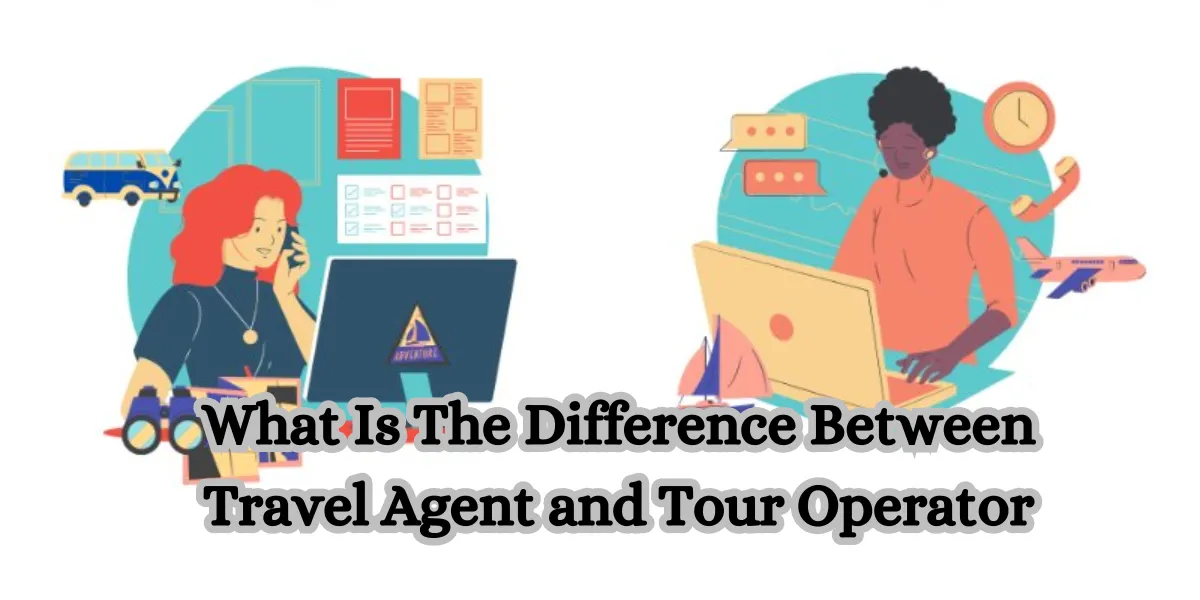
What Is The Difference Between Travel Agent and Tour Operator?
When it comes to planning a vacation or an adventure, two essential roles in the travel industry often come into play: travel agents and tour operators. While both contribute to making your travel dreams come true, they serve distinct purposes. In this comprehensive guide, we’ll break down the differences between these two professionals and help you understand their unique roles and responsibilities.
Travel Agent
Travel agents are your go-to advisors when it comes to booking individual or group travel arrangements. They act as intermediaries between travelers and travel service providers, helping you find the best deals on flights, accommodations, and transportation. Here are some key points to consider when working with a travel agent:
Personalized Travel Planning
One of the primary benefits of using a travel agent is their ability to customize your travel experience. They take your preferences, budget, and desired destinations into account to create a personalized itinerary that suits your needs.
Expert Advice and Recommendations
Travel agents are well-versed in the travel industry and can provide expert advice on various destinations, travel insurance, and visa requirements. They can also recommend the best travel options based on your interests.
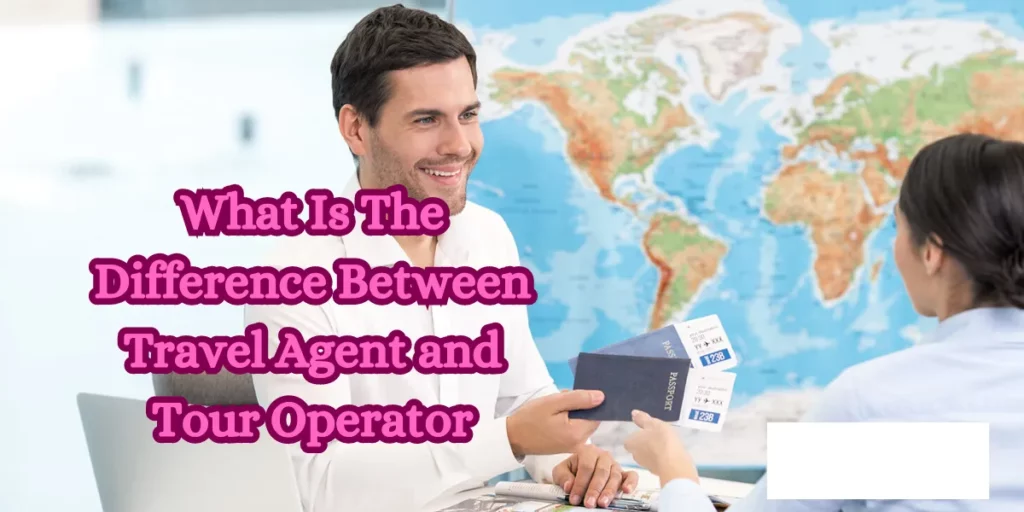
Booking and Reservations
Travel agents handle all the logistics of your trip, including booking flights, hotels, tours, and other activities. They take care of the paperwork and ensure that everything is in order for your journey.

Problem Resolution
Should any issues arise during your trip, such as flight delays or hotel overbooking, travel agents can assist you in resolving these problems, making your travel experience smoother.
Tour Operator
Tour operators, on the other hand, specialize in creating and organizing group tours and travel packages. They work closely with various service providers to offer comprehensive tour experiences. Here’s what you need to know about tour operators:
Pre-Packaged Tours
Tour operators design pre-packaged tours with specific itineraries, activities, and inclusions. These tours are often themed and cater to different interests, such as cultural, adventure, or culinary experiences.
Group Travel
Tour operators excel in coordinating group travel experiences, making them ideal for travelers who want to explore new destinations with a guided group of like-minded individuals.
Inclusive Services
Tour operators typically include all essential services in their packages, such as accommodations, meals, transportation, and guided tours. This simplifies the planning process for travelers.
Expert Guides
Tour operators provide knowledgeable tour guides who accompany groups and provide insights into the destinations, enhancing the overall travel experience.
Choosing the Right Option for You
The decision to work with a travel agent or a tour operator depends on your travel preferences and needs. If you prefer a personalized, flexible trip and enjoy making individual choices, a travel agent is the way to go. On the other hand, if you’re looking for a hassle-free, group travel experience with a pre-planned itinerary, a tour operator can offer you a convenient solution.
In the world of travel, both travel agents and tour operators play crucial roles in helping you explore new horizons. Understanding their differences can assist you in making informed decisions and ensure that your next adventure is tailored to your preferences.
New Shukriya Travels LLC Ajman:
New Shukriya Travels LLC Ajman is a prominent travel agency located in Ajman, United Arab Emirates. With a reputation for excellence in travel services, they offer a wide range of travel solutions, including flight bookings, hotel reservations, tour packages, and visa assistance. Whether you’re planning a business trip or a leisurely vacation, New Shukriya Travels LLC Ajman strives to provide top-notch customer service and ensure a seamless travel experience for their clients. Their dedication to customer satisfaction and expertise in the travel industry have earned them a loyal clientele and a strong presence in the travel market.
- October 8, 2023
- No Comments
Share this Post
Leave a reply cancel reply.
Your email address will not be published. Required fields are marked *
Save my name, email, and website in this browser for the next time I comment.
In today’s fast-paced world, the demand for electric vehicles (EVs) is on the rise. As more people embrace sustainable transportation
In the ever-evolving world of kitchen design, the choice of the right sink can make a significant impact on the
Are you tired of living with back pain? Do you struggle to find comfort and relief from the aches and
Whether you’re searching for hidden gems in your city, planning your next adventure, or seeking travel tips, we’ve got you covered. Join us on a journey of discovery and let counterboys.com be your trusted guide.
Essential Links
- Term & Conditions
- Privacy & Policy
Blog Favorites
How is a Travel Agent Different to a Tour Operator?
There are many ways someone can sell services in the travel industry. Sometimes it can get a little confusing to distinguish who is doing what. A very common mix up to make is between a travel agent and a tour operator, both of whom operate very differently. However, it’s not unusual for a travel agent to be queried on issues that are actually the tour operator’s job and vice versa.
In short, travel agents and tour operators are both travel service providers. This is where the similarities end. It’s important to know the difference in order to make communication with your service providers more efficient.
What is a Travel Agent?
Put simply, a travel agent is the person that sells travel services to a consumer (individual, group, corporation) on behalf of the supplier, namely the tour operator.
A travel agent doesn’t create the elements of travel services, nor do they create the pre-made packages that they sell. They are there to make the booking of travel services easier for consumers, and communicate financially and legally with both the tour operator and the traveller.
A travel agent might sell a package, individual services separately, or negotiate with different suppliers for a custom package they sell. The final protection will inevitably be covered by the tour operator.
An example of this would be as follows:
- You speak to your local travel agent and you explain your budget and what type of holiday you are looking for,
- Your travel agent then sources a range of different packages that will suit you and offer a collection of different options.
Each of these packages will have been sourced from a tour operator. So, when you book your holiday your ATOL protection will be protected with the tour operator.
A travel agent is a traveller’s best friend when booking a holiday. The travel agent knows which tour operators will be more suitable and which will offer you the best services.
A travel agent is your agent. They work for you to source the best holiday they can to suit you. Finding the right one is important, if you need some suggestions to get your started, you can visit out page on choosing the right travel agent for you.
What is a Tour Operator?
By definition, a tour operator is the person/company that works with suppliers and other service providers to put together holiday packages under the terms of the Package Travel Regulations that you can find on the government site .
A tour operator might arrange with hotel and air travel providers for specific flights and accommodation to be in a package that they can then sell to consumers through the travel agent or directly to the consumer.
A tour operator works with all travel elements, including:
- Accommodation
- Tourist services
What’s the Difference Between Them?
The difference is that the tour operator creates packages and sells them either to the consumer or the travel agent. Whereas, the travel agent only sells the packages on behalf of the tour operator and does not create packages.
For this reason, travel agents tend to have good relationships with many different tour operators for different destinations or specialities. They will supply a lot of their holidays from those trusted tour operators.
Equally, a tour operator will also work with specific travel agents they trust to sell their packages to consumers, or directly to the consumer. They are, however, more likely to go through a travel agent for a few reasons:
- They’re selling international travel
- Someone else is dealing with consumer money directly
- They’re selling more niche packages
They could do this for a variety of reasons including convenience or focusing on specific elements of their business. It is also useful with international travel for currency exchange and selling travel to people. For example, in the UK through a UK travel agent if the tour operator organises local packages elsewhere.
Why is This Important?
It’s very important to know this difference when you’re trying to communicate effectively with your travel agent as the consumer.
Often travel agents will get the brunt for a mistake that is actually the tour operator’s responsibility, and vice versa. This can cause a lot of unnecessary conflict for the consumer and the providers. Your travel agent is there to support you and will inevitably find a suitable answer but do always remember that an agent is an intermediary between you and the principle tour operator or supplier.
This issue is much simpler with travel agents that are Protected Trust Services (PTS) members as the PTS protection offers complete financial track and trace. Travel agents and tour operators that are PTS members can only use your monies to book your holiday unlike many others in the UK that use consumer money as working capital.
If something goes wrong with any of the elements of the package you can always speak to your travel agent. This is why we state it is so imperative you pick a travel agent that you know and trust. Holidays are a high ticket item, they are expensive, and they should be free of stress. A great travel agent, especially a PTS travel agent, offers excellent service, incredible knowledge, and supports you every step of the way.
If you are still uncertain when something happens with your holiday, or you need to know where your money is for whatever reason and you are working with a PTS Member please check out our protection of consumers page , or you can contact PTS directly by calling 0207 190 9988 or emailing us at [email protected] .
Share This Story, Choose Your Platform!

May 2, 2024
5 Brilliant Reasons You Should Start Booking with a Travel Agent
Though the travel industry is deep in its latest evolution, travel agent businesses are still seeing a consistent rise [...]

September 14, 2023
Extreme Weather Conditions: How Is Your Holiday Affected?
Over the summer months, there has been a noticeable number of situations related to extreme weather conditions around the world. [...]

August 16, 2023
Industry Powers: Who Should I Contact First With Issues?
The industry powers for consumer law in the travel industry are changing and the proposed bill will be giving consumers [...]
Want to know more about how PTS protect your holiday?
307-315 Holdenhurst Road, Bournemouth, Dorset, BH8 8BX
Contact No.
- 020 7190 9988
Email address
Subscribe to Our Newsletter
© Copyright 2024 Protected Trust Services | Company No. 06181223
Sitemap | Privacy Policy
Can’t find the PTS member you are looking for?
That's not a problem, click the link below to get in touch.
Do contact the PTS office directly and the team will be happy to assist you.
- Tracking Cookies
Functional Cookies
- Google Maps
Necessary Cookies
Tour operator vs travel agent: Differences and similarities between both
Lots of people discuss whether thereâs a difference between tour operators and travel agents. Whether you are in the travel industry or not, you will find yourself misunderstanding some terms, here, weâll set a common misconception straight.
Each one of them brings in a different perspective that weâll touch on in detail later on. In spite of the fact that they have distinct functions and purposes, one of the strongest similarities between them is that travelers can get some astounding results and a tremendous value all the time, no matter what.
While the differences between both are indeed quite abundant, you do need to keep in mind that travelers might end up working with either tour operators or agents if they opt for a trip. Each one of these businesses will play a different role based on the situation at hand.
The idea here is to fully understand what each one of them does and how it works. Now, letâs hop onto what weâre here for:
Tour operators
The tour operator is a company, firm or organization that will buy travel components separately from multiple suppliers. Then they will combine those components the way they want into a single package. This package will obviously come with its own price tag.
For example, they can control, book and devise an entire trip by creating a package holiday that include elements like airport transfers, accommodation, activities, tours. However, a tour might not necessarily include all of these elements.
The sales process of these tours will take place either directly or via a middleman . It totally makes sense and it will bring in front a tremendous, powerful experience for the customer.
Their main responsibility is to deliver and also perform all those services that are specified within the tour package. Sometimes, they will provide some of these services on their own!
Obviously, things will differ from one tour operator to the next. While some of them go for the simpler approach, others just help customers find the best experiences in packages and they go from there.
Some consider them to be wholesalers and they are not entirely wrong here. They do buy services and goods in bulk but they do prepare a complete experience for the customer to enjoy and appreciate.
There are operators that come with inclusive tours, those tours that you just canât find anywhere else, which are extremely specialized and a pleasure to be a part of all the time.
As you can imagine, all tours can be adapted and adjusted based on the customer requirements. It offers a much more impressive and comprehensive experience, and the payoff alone will be second to none due to that, especially in the long run.
There are multiple types of tour operators. The inbound operators are the ones that will receive guests and handle arrangements in the host country, they mostly offer community based tourism experiences. The ones that promote tours for foreign destinations are outbound operators .

Domestic tour operators are, as the name suggests, offering their services to domestic travelers, even if the services are not entirely taking place within the country. And you will also have ground operators , which are locally based and tend to partner with other travel businesses mainly instead of selling transportation and guide services individually.
According to IBISWorld , the tour operator industry has significantly grown over the past five years to 2019. In the present year, it reached a revenue of $8 billion .
Travel Agents
The travel agent is a person that knows tourist products very well and that are directly selling them to customers. They help tourists narrow down their search as they hold the role of selling and administering travel packages from various tour operators. This allows to offer various types of customers different experiences that suits each of them best.
The thing to note is that they will either be the owner or a manager of an agency, and they might have employees that will advise tourists and sell packages. But this can also be an individual, depending on the situation as you can imagine.
As for travel agents, they are the ones that play a major role when it comes to promoting tourism in a certain country or a destination. The travel agency will process and package all attractions, amenities, ancillary services, and so on.

How to Keep Hotel Guests Coming Back
What travelers consider when choosing a tourist destination.

Personalization
Customer service, sustainability, getting started, selling online, reseller guides, get started with tashi today.
Try Tashi Free for 14 days. No credit card needed.

7 Differences Between Travel Agent and Tour Operator
- Post author By varun
- Post date November 16, 2022

The travel industry is vast and expansive in nature. There exist multiple avenues through which a person can contribute to this ever-growing industry and consequently make a good amount of money. Due to the diversity of the platform, it can get confusing to comprehend who is engaged in what task.
One of the most common mix-ups takes place between what is known as a ‘travel operator’ and a ‘travel agent’. This blog will explain the significant difference between travel agent and tour operator. These two designations are different, but confusion arises because of the similarity in the terminology.
These two professions have characteristics that overlap each other, and in that sense, a travel agent can do specific tasks that are more likely to be done by a tour operator and the other way around.
In other words, travel agents and tour operators tackle the objectives of the travel and tourism sector. However, legitimate differences broadly divide the nature of both job descriptions.
Once you are aware of the difference between travel agent and tour operator, you will find it easier to avail services from each one of them in a more seamless manner.
What is a Travel Agent?
In the simplest terms, a travel agent is a representative of the travel and tourism industry who sells travel services directly to the end consumer. In this case, the end-consumer could be an individual, a group, or a corporation.
A travel agent is not in charge of creating the various travel services that customers look forward to buying, and their principal task is to act as a middleman between the tour travel companies and the clients. A travel agent makes it easier for the customer to find and avail of the right services at any time.
Becoming a travel agent takes more than knowing about the available travel services available in the market. In order to become a successful travel agent, one needs to imbibe excellent interpersonal and communication skills. Since the travel agent handles people, their overall people-handling skills take precedence over everything else.
Among other things, travel agents make customers aware of the different individual or compact packages that travel companies sell. When they are able to sell one or more of these services, they get a share of the profit.
What is a Tour Operator?
Tour operators are generally entities who are the real brains behind a particular travel service compilation. It could be an individual or a group of individuals who come together to build travel packages for interested travellers.
Tour operators work closely with various service providers, such as airlines and hotel chains, to coordinate a travel itinerary. A tour operator will work under the strict guidelines of travel regulations of the country where the operations will take place.
While plying their trade, tour operators could sell their services directly to the client or do it via a travel agent. A tour operator works in tandem with the latest offerings of the airline, hotel, and other allied industries to squeeze out the best deals for their prospective clients.
Be it transport and accommodations services, flights and airline tickets, hotel bookings, sightseeing, food, and lodging, it is the job of the tour operator to get everything sorted in the first place.
Once the entire structure of the services is compiled and adjusted per the end-user’s needs, they launch their travel services via online or offline means. In a way, the travel agent is dependent on the tour operator for success at both ends.
Seven Difference Between Travel Agent and Tour Operator
The main difference between a travel agent and a tour operator is that the latter is the architect of travel ideas and packages, which they then sell to either the travel agents linked to them or directly to the customers.
On the other hand, a travel agent will not develop travel plans from scratch but sell the same generated by tour operators they are working for or attached to.
Since travel agents are wholly dependent on tour operators for giving them the opportunity to sell services to clients, they make it a point to maintain camaraderie with a host of tour operators.
A travel agent will have close connections with several travel companies/tour operators as it increases their chances of getting hold of better deals and offers. They then bring those deals in front of the customer. Travel agents could maintain these links via the online mode or offline mode , or both.
This bond between a travel agent and a tour operator is based on mutual trust. Tour operators only allow specific travel agents to advertise and sell their services. Likewise, there will be travel agents who will work for only a chosen set of tour operators.
There will be instances when a tour operator would be more likely to sell its services to the clients via a travel agent. This happens when the tour operator is dealing with cases like international packages and targeted niche packages.
In some countries, such as the UK, the government has mandated that tour operators are required to engage travel agents to sell some specific services. This has been done with an eye to providing more employment opportunities to the local populace.
Importance of Knowing the Difference Between Travel Agent and Tour Operator
From the standpoint of the consumer, it becomes crucial to understand the difference between the travel agent and the tour operator. This is because as the end-user, you are supposed to know where you will find the correct information when trying to connect with either one of them.
There are often moments when customers blame travel agents for anomalies in services, which are the tour operators’ responsibility. The reverse is also true in other cases. When an instance like this occurs, it culminates in customers fighting with the travel agents and the tour operators.
The end user must also understand that a travel agent will not have total control over tour operators’ services. The travel agents go to great lengths to ensure that the customers are happy and satisfied with their travel experience.
However, in case there emerge untoward incidents, the customer should also fully cooperate with all the parties to come to an amicable solution.
At the end of the day, it is up to the consumer to determine which travel operators are rated highly in the public domain. Once they are confident of their choice, their next task would be to opt for a well-known travel agent who is diligent in their work and customer-friendly.
Once these two aspects are taken care of, the consumer can simply relax and interact with only the travel agent or both. Since travel is generally an expensive affair, you as a consumer must dedicate enough time to select only high-value tour operators and travel agents.
People mostly go on travels to recharge their exhausted minds after many days of hard work. Ergo, the right choice before the journey will go a long way in ensuring you have a memorable trip with your loved ones.
Now that we discussed the difference between travel agent and tour operator, we would like you to check out our other Pathfndr blogs. They will surely give you valuable insights into the travel and tourism industry.
A Travel Agency vs. A Tour Operator
- December 9, 2015
Spring Break Packing Checklist
Top 5 spring break destinations for 2025, top spring break destinations, how to book with us, top 10 spring break hotels 2025, 5 tips for choosing a spring break hotel.
We have a lot more just for you! Lets join us now
At first glance, a travel agency and a tour operator may appear identical, and they are similar. But what are the differences between a travel agency and a tour operator? A Travel Agency vs. A Tour Operator
Both a travel agency and a tour operator will help you go on a trip. Both will sell you travel insurance (never go on vacation without travel insurance). Both will do their best to make sure you have a good time. That’s where the resemblance ends.
A tour operator specializes. A tour operator knows an area well. A tour operator can get you into the best sightseeing attractions, take you to restaurants with delicious local cuisine, and make sure you spend your nights in comfortable surroundings. And if there are any problems, your tour guide is there to help — you don’t need to call a travel agent who’s 2,000 miles away.
If you’re an experienced traveler, you may feel comfortable improvising. In that case, a certified travel agent might be the right person to help you (choose a certified travel agent, one who belongs to ASTA or CLIA). If you’re traveling aboard for the first time, you might prefer a little extra help. You don’t want to take the chance on a bed and breakfast being full, or the restaurant your cousin recommended being closed. You want to know where you’re going and what you’re doing. You may want a translator; you’ll definitely want an experienced guide. A tour operator can arrange all that for you.
A travel agent will help you arrange transportation, find lodgings, and suggest an itinerary. A tour operator will arrange your transportation, lodgings, food, entertainment, and itinerary. A tour operator removes the headaches. A tour operator does the work for you.
Contact Go Blue Tours to arrange a vacation without all the headaches, where all you need to do is enjoy yourself.
SEE OUR DEALS HERE

Related Post
Spring Break Packing Checklist The Ultimate Spring Break Packing Checklist Spring break is just around
Top 5 Spring Break Destinations For Spring Break As the temperatures rise and flowers bloom,
Top Spring Break Destinations Spring Break is full of with sun-soaked beaches, lively nightlife, and

Give Us a Ring
1-855-224-6258
Or Email us Here
Subscribe to GoBlue
Get VIP News & Deals
with the GoBlue Newsletter
Let us do the hard work so you don't have to
Start planning your spring break.
We are experts in Spring Break group travel!
Travel Agent vs. Tour Operator: What's the Difference?
Key Differences
Comparison chart, main function, profit generation, interaction with client, service scope, booking flexibility, travel agent and tour operator definitions, travel agent, tour operator, do i pay extra for using a travel agent's services, can travel agents create custom travel plans, are travel agents useful for business travel, how do travel agents earn their income, how do i ensure a travel agent or tour operator is legitimate, can travel agents accommodate special travel requests or needs, what kind of travel services can a travel agent book, should i tip a travel agent for their services, can a travel agent help if issues arise during my trip, do tour operators only offer group travel packages, can travel agents assist with travel insurance, are all tour operator packages non-refundable, what does a tour operator do, do tour operators provide guides during trips, can i buy a tour operator's package through a travel agent, is a tour operator responsible for managing a traveler’s itinerary, how do tour operators ensure the quality of a travel package, what is the primary role of a travel agent, are tour operators responsible for traveler safety, are the services of travel agents and tour operators similar.

Trending Comparisons

Popular Comparisons

New Comparisons


Tour Operators and Travel Agents
Tour Operators are persons or organisation which organised and sells travel like air, railway ticket, transport and accommodation to a tourist. Moreover, a travel agent is a form of business that sells travel related products and services, particularly package tour to the tourists on behalf of travel suppliers such as airline, hotels, tour operator, cruise liners and other travel vendors.
Several travel agencies are specialized in commercial and business travelers while some agencies have setup separate departments dedicated to a separate sector. Several travel agencies serve as general sales agent for larger and foreign travel agencies or companies. A travel agent plays a significant role which converts a countries attractions, accessibility, amenities into saleable goods commodities and promotes, markets, and convince to buyers. Thus, the place of a travel agent is very prominent among the other types of intermediary operations involved in the provisioning and selling of travel products and travel services.
Travel agent:
Travel agents is defined as an individual, a firm or company who makes arrangements on behalf of tourists in respect of travel tickets, travel documents-VISA, transportation, accommodation , entertainment, insurance, foreign currency and other travel services from the principal suppliers and sells to the prospective tourists. Thus, the definition clearly identifies that a travel agent/ travel agency is a business may be small or big that sells travel related products and services to end-user customers on behalf of third party travel suppliers/ vendors, such as airlines, hotels and cruise lines. Generally, the clients of travel agencies include tourists and business travellers.

Tour Operator :
The term tour operator is used to define the large scale operation in the travel intermediary’s process. Thus, ‘tour operators’ can be wholesaler, and or retailer depending upon market size and organizational structure. Thomas Cook, Thomson, American Express, Cox & Kings, Kuoni, Thomas Bennett are good examples of a dual travel organization. In the Indian tour operation market most tour operators are the outgrowth of successful retail travel agencies in their own travel markets. A Tour operator is defined as an organization/ firm/ company who package the travel to and from a destination along with complete ground services like accommodation , local sightseeing, local cultural fairs / festivals etc. Interestingly, they provide these services themselves as some of the ingredients of tour package they their own or they arrange these ingredients from different destination operators.
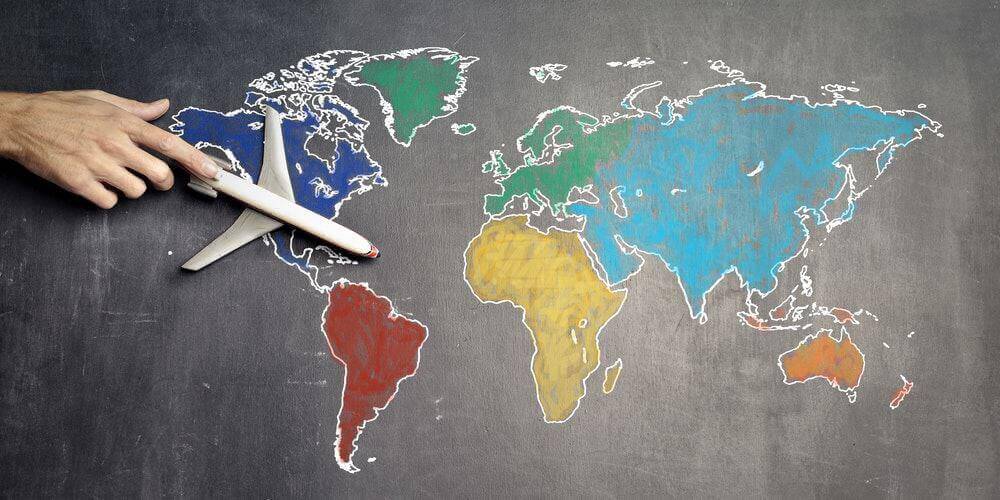
Generally, the industry practices indicates that a tour operator is a firm /company which specializes in the developing, planning and actual operation of pre-paid, pre-planned holidays and makes these available for tourists either directly or through the middlemen. In most of the advertisements in the newspapers, magazines and others we have seen regarding five days/four nights along with tour itinerary and price per PAX. For example, one week in Kerala 5000 Rs. (500 Rs. worth healthcare coupons free or ten days in Goa—heavy off season discounts, beaches, music and other services for Rs. 40000 inclusive meals per PAX etc. There are numerous offers like this in the newspapers and magazines. Generally, these offers of package tours are available for both individuals as well as groups. Now the question is that we have ever paid any attention to these offers that who have packages such tours and why? Or how they are packaged and marketed these products/ services to general public? Some people arrange these products/ services by their own and some approach the professional organizers to arrangement on their behalf. When we arrange travel services/ product by own definitely this is a time consuming process. On the other hand there are many people who don’t want to bother themselves about arranging, planning and organizing their own journeys rather they want this to done by someone professional expertise. It is the tour operator who packages all attractions of a destination into one composite product and retails it through the travel agents or directly to the tourists. He creates the demand, travel, market and image of the destination. Today, many tourists buy these package tours as per their interests, priorities and budget at a price that is pre-determined. The complete holiday package tour includes travels (air/surface), accommodation , sightseeing, insurance, currency, escort/ guide and so on. The person who puts together all these aspects into a package is known as the Tour Operator.
Practically, a tour operator is a firm/ company who provides travel information, plans, organises and coordinates travel related services/ products with various ground operators to create a tour package. At the same time tour operator also ensures smooth conduct and operation of the package tour due to this professional work a tour operator is also called a Tour/Travel consultant or Tour Coordinator. The tour Operator may or may not necessarily have any product of his own but act as an intermediary for different travel vendors to tailor a package to meet the varied needs of a traveller. In fact, a tour operator plays a pivotal role in organizing, explorations, research expeditions, planning and operation a tour package. We must appreciate here that tour operations originated ever since people wanted to explore new areas/ destinations, go on pilgrimage / religious or trade expeditions, individually or in groups.
Definition of a travel agent and Tour operator
• The American Society of Travel Agents ( ASTA ) defines the travel agent as follows: “An agent is a person who undertakes a job for another person, who is the ‘principal’. The principal in such a relationship not only sets the goals of the job, such as selling tickets, but also may control the means and manner in which the job is done”.
• According to Airlines Reporting Corporation (1987), “a retail travel agent is defined as a business that performs the basic functions : quoting fares and rates, makes reservations, arranges travel tickets, books rooms, arranges travel documents, and acts on the behalf of tourism vendors.”
• Joel M. Abels, (1985) “A travel agent is an individual who, based on recognized industry standards of expertise and experience, is deemed qualified by travel agent peers and by travel principals to offer and sell travel arrangements and services to the general public”.
• Aryear Gregory (1985), “The tour operator is the architect/manufacturer who assembles the tour ingredients and creates travel, creates a market, creates lead and creates an annuity by having satisfied clients who return year after year”.
• James M. Poynter (1993) defines, “tour operator is one who has the responsibility of putting the tour ingredients together, marketing it, making reservations, handling all financial and accounting aspects, and selecting as well as managing tour managers”.
• Mohinder Chand (2006). “ a tour operator is an organization which conceives idea of tourism product and converts this idea into realities by repeating tourists again and again”.
Difference between Travel Agent and Tour Operator
Historically, the tour operator has mostly emerged from retail travel agency. However, today a clear distinction must be made between a travel agency and a tour operator.
Essentially a travel agent is a retailer and tour operator is a wholesaler. The travel agent is a retailer because he sells the travel services to the final consumers i.e. the tourists directly.
But unlike the travel agency, the tour operator is a manufacturer of the tourism product . He plans, organises, sells and conducts the tours. He acts as a wholesaler also sometimes because he has to engage travel agents as middleman to sell his package tours in different territories. The Figure 1.1 makes amply clear the flow of travel services from suppliers to the tourists. Moreover, the role of travel agent and tour operator in the tourism market is well defined. In fact, due to strategic alliances and world integration this distinction is meaningless as both are performing similar functions.
The main difference as:
• Travel agents usually sell to end-users on behalf of travel vendors.
• Tour operators plan almost each and everything related with tour package.
• Tour operators are specialized in dealing with specially one country/ one destination at a time. But there’s no specialization in the case of a travel agent.
• Most of the cases some travel agents work directly with tour operators and provide the tour operators with the information of clients.
• Travel agent gets permit to work from the respective tour operator either private or public while tour operator acquires license from the Ministry of Tourism.
• Becoming a travel agent doesn’t require so much time/ money as compared to the tour operator.
• Tour operator is directly responsible to the regulatory authorities while travel agent is first responsible to the clients and then to the tour operator.
• The main source of income of travel agent is commission and other reserves while a tour operator earned profit by providing services/ products to the clients and he also earned commission from the different travel vendors like hoteliers, transporters, airlines , cruise companies and destination companies etc.
IMPORTANCE AND FUTURE OF TRAVEL AGENT AND TOUR OPERATOR
Over the years, the role and contribution of travel agents and tour operators have been changed. In the beginning travel agent were ‘mom and pop’ organisations but today they are more professional and operating a large scale. Inbound travel has been dramatically hit by introduction of VISA on Arrival and different promotional measures adopted by the Indian government like Incredible India In fact; all forecasts are that travel between countries will continue to enjoy substantial growth through the 21st century. Thus, tourism between different countries has shown tremendous growth during 2016-2017 and India is no exception in this context. Recent figures from the Ministry of Tourism , Government of India have shown that whereas the overall number of domestic holidays increased by 20% between 2000 and 2016, the domestic market will grow by 20% in the five years to 2017 and this is good news for the tour operation industry. Outbound travel has, of course, enjoyed continuous growth since the advent of overseas package holidays in the 1990s. Whilst the outbound package market has in recent years increased at approximately 10 million holidays each year, independent holidays taken abroad are still growing strongly, and ensure that the overall outbound market continues to grow each year( Ministry of Tourism , GOI, 2016).
The following points are clearly described the role and contribution of travel agent and tour operation business in India:
· Travel Inf ormation:
Travel information is first and foremost activity of a tour operator. Today, most of the tour operators have developed an internet presence by posting a website, with detailed travel information. Moreover, use of technology has become vital for all travel companies. Most of the travel companies hired specially technology firms to maintain their website and upload latest travel information. Moreover, these companies use travel service distribution companies who operate Global Distribution Systems (GDS), such as Sabre Holdings , Amadeus , Galileo and World span to provide up to and minute detailed information on tens of thousands of flight, hotel, transporters, car rental and others related with tourism services including package tours .
• Tourist Publicity Material:
Tour operators produce huge tourism related material to attract and motive the tourists. Moreover, travel agents and tour operators brought out a range of publicity material including shell folders on adventure, wildlife, tourist resources of South India Rajasthan and other states including tourist map and trekking maps of Himalayas. It also produced a general India brochure and those on various states and tourist destination in India. Thus, they are exploring India at global level.
• Promotion of Tourism:
Many tour operators and travel agents in collaboration with central or states governments have launched major campaign on “Tourism Environment / Awareness”. These campaigns are being released in all leading magazines across the country in Hindi, English and other Indian languages. The themes of the campaigns are “We can and we will keep India beautiful”. Besides, the department also launches advertising campaigns to promote lesser known bill resorts called “Holiday Campaign”; to promote Orissa and a campaign to promote Andaman and Nicobar and Lakshadweep Islands.
• Tourism development Planning :
Since tour operators play a pivotal role in tourism industry. They are actively involved and participate in tourism developmental processes and tourism policy formulation in the respective areas. Every state in India has recognized that tourism has a vast potential for development in the country. Appreciating this potential Government has accorded the status of an industry to tourism. Government has also extended various financial and non-financial incentives to tourism industry to motivate the tourism players. Private sector investment has encouraged in developing tourism and public sector investment should be focused only on development of support infrastructure. Thus, travel agent and tour operators are focusing on the following states so that tourism may developed in a planned and systematic manners such as states of Uttaranchal, Himachal Pradesh, Uttar Pradesh, Haryana, Meghalaya, Andhra Pradesh, Kerala, Arunachal Pradesh, Tamil Nadu, Bihar, Tripura, Manipur, Assam, Karnataka and Union Territories of Andaman arid Nicobar and Lakshadweep etc.
• Promotion of Wildlife Tourism:
To promote wildlife tourism, facilities are provided in the form of Forest Lodges and transport within the sanctuaries / national parks: Forest Lodges at Enjal (Gujarat), Manas (Assam), Dhangari (UP) and Parambikulam (Kerala) is in progress. The work of Forest Lodges Betla (Bihar) Simlipal (Orissa), Desert National Park, Ranthambhor, Ranakpur (Rajasthan). The tour operators are adding these destinations in their itineraries so that special interest tourism may be promoted.
• Tourist arrivals and Foreign exchange earnings:
As per Government reports, the year 2016 has been a highly successful year so far as tourism in India is concerned. For the third successive year, India witnessed a positive growth in foreign tourist arrivals. Today, tour operator have been recognised as a vital component of travel and tourism industry and have become an integral part of this industry at global. They Account for more than 90% of international and 75% of domestic tourist traffic. Further, more than 70% of all travel agency revenues are derived from the business travel. Most travel agencies sell both commercial and leisure travel but there is many travel agencies which only specialize in one sector or the other. It is also appreciated that more than 50% tourists are coming through the travel agency and contributing huge foreign exchange to the country.
• Development of New Products:
Various strategies have been formulated and implemented for tourism to meet the diverse needs of the tourists. Such as cultural tourism, wildlife tourism, sports tourism, social tourism, mountains and beach tourism, promotion of fairs and festivals, and leisure tourism and development of travel circuits.
• Employment generation Promotional:
Travel agent and tour operators are the major players in the tourism industry. In fact, most of the tourism management students are employed in this vital sector of tourism industry. More the 25 million people are working directly or indirectly in this sector. Event many tourism management students are establishing their own ventures. This is also helps the students to enter into their own business enterprises.
• Analysis of potential Tourism markets:
Most of the tour operators conduct market analysis and accordingly develop product. In fact, tour operators / travel agencies analysed tourism market potentials’ produce modified products based on the existing products and use technologies and skills. They identify potential of both domestic and foreign customer groups with description relevant characteristics like age, income, preferences and influencing factors on future demand. They also identify the unique selling point along with description of wanted characteristics product by the tourists.
Thus, by 2020, the government of India expects travel and tourism to contribute Rs8, 500 billion to GDP, almost four times the value in 2010. With successive governments committed to reform, a strong manufacturing sector and a private sector that already has a critical mass that is needed to drive growth, it is unlikely that the strong growth in GDP is likely to be reversed ( Ministry of Tourism , GOI, 2017).
You Might Also Like

Flash Packing

Dark Tourism

Computerized Reservation System (CRS)


Download WP Travel
Please enter your email to download WP Travel and also get amazing WP Travel offers and Newsletters.
What is a Tour Operator? Types, Importance, Pros & Cons
Home » Blog » What is a Tour Operator? Types, Importance, Pros & Cons
Tour operators are the masterminds behind many unforgettable vacations. They organize travel experiences taking the hassle out of planning for travelers ensuring a seamless journey.
But what exactly are tour operators? What do they do, and why are they important?
Stay with us as we discuss all the above queries and more!
Table of contents
What is a tour operator, 1.inbound tour operators, 2.outbound tour operators, 3.domestic tour operators, 4.receptive tour operators, 5.ground tour operators, roles of a tour operator, importance of a tour operator, best tour operators, best tour operator software, tour operator vs travel agency, difference between a tour operator and a travel agency (infographics), frequently asked questions.
A tour operator is a company that specializes in designing and packaging travel itineraries . They act as a one-stop shop for travelers, offering pre-arranged tours that typically include flights, accommodation, transportation, sightseeing activities, and sometimes even meals.
They cater to various interests and budgets, offering adventure trips, cultural experiences, luxury getaways, and more. A tour operator not to be confused with a travel agency thinks up ideas for holidays, researches the ideas, designs the holiday itinerary, and contracts all the services needed.
Types of Tour Operators
Tour operators can be divided into five main categories: inbound, outbound, domestic, receptive, and ground.

Inbound tour operators bring tourists into the country in groups or through individual travel packages. They make all the arrangements in the host country, and the trips they organize are mainly intended for foreigners visiting the country.
When a group of Indian tourists wants to explore France, the company in France that organizes the whole trip is called the inbound operator. So inbound operators are local and offer trips that include their own country.
Unlike inbound, outbound tour operators work in their own country to take travelers to other countries. These are operators that market their travel to international destinations for either business or leisure.
For example, suppose a group of German tourists are planning a trip to India. Then the outbound operator is a German travel company that handles all ticket and hotel reservations.
Domestic tour operators are those who put together complete travel packages and sell them to domestic travelers. In other words, they are operators that offer travel packages and trips in the tourist’s home country.
Domestic travel usually involves residents of a certain country traveling within that country. They can visit national parks, scenic areas, hospitality tours, city tours, hikes, etc.
Receptive Tour Operators (RTO) provide travel products to companies in other markets (as a business-to-business relationship).
In particular, RTOs sell travel products to operators and/or travel agents, whether sold in a package or individually. They are primarily wholesalers and do not sell directly to the public.
Ground Tour Operators operate domestically. However, they differ from domestic operators in that they organize trips for inbound tourists on behalf of the inbound operator (and sometimes also the outbound).
Tour operators are responsible for the operation of a vacation by contracting, booking, and packaging together various travel components . These components can include: hotel, transportation, meals, guides, optional tours, and flight.

- Development of Tour Packages: These professionals develop travel packages for individual clients or groups of travelers. They work with clients to understand their interests and recommend different attractions, accommodations, and transportation options to help clients choose a travel package.
- Negotiating Prices: Companies usually negotiate prices with other vendors, such as hotels and transport companies. For example, they can ask the hotel to lower the room rates for a large tourist group.
- Travel Management: These professionals help organize travel plans for clients to reach their destinations. For example, they can book a bus to help customers travel between cities or a rental car to help customers reach various attractions.
- Providing Customer Support: The company provides customer support to help their customers prepare for their trips. For example, they can answer customers’ questions about the destination, provide information about exchange rates, or notify them of changes to travel plans.
- Travel Budgeting: Travel companies work with clients to help them budget for their trips. They develop different itineraries at different prices and advise clients on accommodation and sightseeing within their desired budget.
- Researching Travel Options: These professionals research different trips to give their clients recommendations on places to visit, stay, and eat. They read articles and search the web for information on travel trends and new destinations to stay current in their field.
Explore this article “World Tourism Ranking by Country 2024”
Pros and Cons of Tour Operator
A tour operator puts together packages by bundling the individual services making up itineraries. That’s why it’s sensible to review your options.
So, what exactly are the advantages and disadvantages of using a tour operator?
- Competitive Prices: They can offer more economical packages than individual options providing better value for money. They often negotiate discounted rates, making travel more affordable.
- Peak Season Options: They can anticipate peak season dates and offer options for these times.
- Convenience: Travel companies can provide seamless connections from one location to the other. They handle everything, allowing travelers to relax and enjoy the experience.
- Expertise: Their knowledge of destinations ensures a well-rounded itinerary with hidden gems and local experiences. They can ensure that travelers don’t miss any hidden corners of a destination.
- Reduced Stress: No need to research or book individual components, leaving travelers free to focus on having fun.
- Resolve Unseen Problems: Travel companies can resolve unforeseen problems, such as flight delays or cancellations.
- Safety and Security: Companies can provide an environment of safety for visitors. They can assign guides for support and guidance, especially in unfamiliar destinations.
- Assurance: If the arrangements made by an operator fall short of what was agreed, you can seek redress by way of a refund.
However, working with an operator can have downsides as well. Some disadvantages may include:
- Less Flexibility: Itineraries are predetermined, offering less freedom for spontaneous exploration. If you discover an activity or a restaurant you’d like to try that isn’t on your pre-planned itinerary, you may not be able to explore it.
- Limited Personalization: Customization options might be limited compared to independent travel.
- Higher Cost : It might not be your cheapest option. Tour packages can sometimes be pricier than piecing things together yourself.
- Larger Groups: Tour groups can range from private trips to groups of 50 or more people. Some tours involve group travel, which might not suit everyone.

Tour operators play a vital role in the tourism industry by planning and coordinating travel plans, travel packages, activities, and itineraries for their clients.
They use their expertise and resources to create high-quality tour packages helping tourists travel stress-free. Other reasons why tour operators are important are:
- Competitive Pricing: They negotiate in advance with hotels and airlines and offer you the best rates.
- Well Organized: Since the company is a travel company, they want to provide you with the best ground services. They personalize and ensure that every part of the tour is well taken care of.
- Boosting Tourism: They promote destinations and generate tourist revenue, benefiting local economies.
- Ensuring Quality: They maintain high standards for travel experiences, making sure travelers have a positive experience.
- Convenience and Accessibility: They make travel accessible to a wider range of people, including those who might not have the time or expertise to plan their own trips.
- Immediate Support System: When traveling to a foreign country things can become uncertain at any time. A competent company handles all these unprecedented events efficiently.
- Supporting Local Businesses: They partner with local businesses, contributing to the growth of sustainable tourism practices.
- Networking Opportunities: A tour company targets many people like you. Staying, traveling, and eating together is a great way to increase your network.
There isn’t a single best tour operator as it depends on your travel style, budget, and destinations. However, here is a list of the 10 best travel companies & tour operators in the USA with 191,668 reviews. [Source: tourradar ]
Travel companies that organize guided tours use travel operations software to manage customer information, travel information, and background functions. This type of tour operator software helps companies keep track of the organizational aspects of travel such as schedules, itineraries, meal plans, and more. In addition, it tracks tourists and participants, as well as personal tasks and activities. Companies can use this type of software to manage costs, expenses, and revenue. Capturing 75% of the Global Tourism market with over 883,934+ downloads globally and surpassing software like Rezdy, Peek Pro, Bokun, and more, the best software is found to be WP Travel . Here’s a list of the 5 best tour operator software:
Check this article on Best Tour Operator Software for a detailed overview of features and prices.
A tour operator is a person or organization responsible for planning travel and vacation packages. G Adventures and Intrepid Travel are some famous examples.
A travel agency is a private broker or agency that sells holiday packages. American Express Travel is an example of a travel agency. While Booking.com is also a travel agency, it is regarded as an Online Travel Agency (OTA) rather than a traditional one.
When the tour operator creates services, the travel agency is the intermediary that sells those services.
Further differences between a tour operator and a travel agency can be discussed below:

Explore this article “Tour Operator vs Travel Agent- What are the Differences?”
Launching your own tour operator business can be an exciting and rewarding venture. Here’s a roadmap to get you started: 1. Research the market and develop a solid business plan. 2. Create a unique brand and effective marketing strategy. 3. Develop tailored tour itineraries by collaborating with local businesses. 4. Prioritize safety protocols and staff training 5. Integrate technology like online booking and tour management software.
To package a tour, tour operators first research trends, design itineraries, then source local activities, and negotiate bulk rates with hotels and transportation. With everything neatly bundled (accommodation, meals, travel), they create a price-conscious package and market it through various channels. Some even offer customization options for the customer.
Tour operators function by streamlining the travel experience. They utilize bulk rates on flights, hotels, and activities. This allows them to create pre-designed packages that bundle everything you need for your trip – flights, accommodation, transportation, and sometimes even meals or entrance fees. This one-stop-shop approach simplifies trip planning, letting you focus on enjoying the destination.
Here’s a step-by-step process to start your very own tour operator business. Research and Planning 1. Legal and Financial Consideration 2. Branding and Marketing 3. Operations and Logistics 4. Technology Integration 5. Hiring and Training Staff 6. Launch and Growth Strategies. To look into these steps in detail, check this article on starting a tour company .
No, booking.com is not a tour operator. It is one of the largest online travel agencies in the world. Booking.com does not create its own travel packages but helps tour operators from around the world market their packages.

Yam Bahadur Chhetri is a content writer and vivid contributor to the WordPress community and a WordPress enthusiast with an experience of 7+ years in the relative field. He also loves to develop WordPress Themes, Plugins, and custom WordPress development for clients.
Leave a Reply Cancel reply
Your email address will not be published. Required fields are marked *
Save my name, email, and website in this browser for the next time I comment.

Get WP Travel Pro
Create Stunning , SEO friendly and Fully functional Travel website within minutes . No Coding Required !
Suitable for any
- Travel Agency
- Tour Booking Services
- Travel Bloggers
Drive more Sales and Revenues from today !
$ 99 99 USD per year

📢 Santa has sent the gift for Christmas and New Year sales on all WP Travel Pro plans. 🛍️ Use coupon code "XMAS_NEWYEAR2024" at checkout.
Related posts

Top 10 Factors to Skyrocket Your Travel Business Growth in 2024

How to Start a New Travel Blog in 2024 That Makes Money?

Best Tour Operator Software in Brazil
Wp travel modules.
Need more features to save your time and to boost your travel business? WP Travel Pro comes with more powerful modules . While our core travel plugin provides almost all the features that a travel and trekking websites generally needs, our add-ons boost it’s capacity further to make it the best travel engine on WordPress. Whether you want to add new payment method to your site or brush up your trekking listings with beautiful maps show casing your trips, we have all your imagination covered. See all our add ons below to boost your travel website’s features further.

Weather Forecast

Import Export

Partial Payment
Connect with wp travel to join the travel conversation, documentation →.
Explore More
Customer Support →
We are here to help.
Facebook Group →
User Community Forum
Follow On Twitter →
Connect with us on Twitter

Please note: Our website no longer fully supports IE11 , as such you may encounter issues using our website, please try an alternative browser such as Google Chrome, Mozilla Firefox, Microsoft Edge (Windows) or Safari (Mac).

What is the difference between a tour operator and a travel agent?
You may book your package holiday (or other travel arrangements) directly with a tour operator or through a travel agent.
Tour operators put together package holidays and may sell other travel services on their own, such as accommodation.
The tour operator is responsible for all the travel services which are included in the package holiday, even if it uses other suppliers to deliver the services. When you book your package holiday (or other travel services), there will be a contract between you and the tour operator. The contract will tell you who the tour operator is and what they are responsible for.
A travel agent sells package holidays and other travel arrangements that are provided by others, eg tour operators, hotels, airlines. Your contract for the travel services will be with the tour operator or other service provider. Your travel agent may also have its own terms of business which cover how the booking will be made and other relevant information.
A package holiday can come in many different forms and can be sold in different ways. For more information, please click here .
Not all tour operators or travel agents are members of ABTA.

Travel Agent vs. Tour Operator — What's the Difference?
Difference Between Travel Agent and Tour Operator
Table of contents, key differences, comparison chart, primary role, specialization, relationship with suppliers, service focus, compare with definitions, travel agent, tour operator, common curiosities, are tour operators more expensive than booking directly, what does a tour operator do, what is a travel agent, do travel agents charge for their services, what's the benefit of using a travel agent instead of booking online, do travel agents have access to better deals than the general public, can travel agents create custom travel packages, how do tour operators provide specialized knowledge, can i book a travel package through a travel agent, why would someone use a tour operator, what kind of travel packages do tour operators offer, how do i choose between a travel agent and a tour operator, are all travel agents and tour operators the same, is it more cost-effective to plan a trip through a travel agent or a tour operator, can tour operators accommodate special requests, share your discovery.

Author Spotlight
Popular Comparisons

Trending Comparisons

New Comparisons

Trending Terms

Travel Around The World Blog
What is the difference between a DMC and Travel Agency or Tour Operator?

A Destination Management Company (DMC) is a company that contracts with local service providers (tour guides, restaurants, hotels and other vendors) to prepare and deliver custom itineraries for a travel agent’s clients. The purpose of a DMC is to provide an all-inclusive service to a client by coordinating and contracting the travel services that their client needs such as travel, lodging and entertainment while they are at their destination. A tour operator is similar to a DMC in that they offer customized tours and trip planning services on behalf of a brand or destination.
DMS stands for Destination Management System . A DMC is a company that contracts with local service providers (tour guides, restaurants, hotels and other vendors) to prepare and deliver custom itineraries for a travel agent’s clients. It is not uncommon to see two or three different companies working together in this way.
In contrast with a tour operator who provides lodging, meals and transportation for individual travelers as well as providing specific services such as booking air/bus tickets or car rentals; DMCs focus on providing an experience that takes you off the beaten track of your typical tourist destinations.
A DMC is a company that contracts with local service providers (tour guides, restaurants, hotels and other vendors) to prepare and deliver custom itineraries for a travel agent’s clients.
A DMC is a company that contracts with local service providers (tour guides, restaurants, hotels and other vendors) to prepare and deliver custom itineraries for a travel agent’s clients. The term “DMC” is often used interchangeably with “travel agent,” but there are many differences between these two industries.
Travel agents typically work with wholesalers or other agencies that specialize in booking travel packages; they act as middlemen between the client and the supplier of their choice. Travel agents can be based out of one particular city or country but may also have offices elsewhere in the world so they can provide additional services such as suggestions for hotels or restaurants on each destination visited by their clients.
The purpose of a DMC is to provide an all-inclusive service to a client by coordinating and contracting the travel services that their client needs such as travel, lodging and entertainment while they are at their destination.
A DMC is an all-inclusive service that provides clients with a travel experience, managing all of their travel needs such as airfare, lodging and entertainment. DMCs also help you manage your business by finding new clients and saving money on marketing expenses.
A DMC will be able to provide the following services:
- Finders Fee – This is when we find the best deal for you from different suppliers in order to save money on your trip or vacation package. We do this by looking at various factors such as flight times, dates available etc., so that we can make sure that everything works out well without any extra charges later down the line (such as cancellation fees).
- Advance Bookings – If there are specific items which need to be pre-booked prior to arrival at destination then this would be done automatically through our system once payment has been processed through Stripe/PayPal account number associated with booking activity!
A travel agent can use a DMC to maximize profit by purchasing a certain package that meets the customer’s needs while minimizing the cost.
A DMC can provide a variety of services such as custom itineraries, hotel reservations, tour packages and more. It also helps in maximizing profits through strategies like bulk buying and reselling tickets at lower prices than what they are currently selling online or offline.
With this kind of service available through your local travel agency, you’ll be able to save money by getting exactly what you want at an affordable price point!
A tour operator is similar to a DMC in that they offer customized tours and trip planning services on behalf of a brand or destination.
A tour operator is similar to a DMC in that they offer customized tours and trip planning services on behalf of a brand or destination. However, unlike a DMC, which can be used as an umbrella term for any company that provides travel services (such as hotels), there are specific differences between the two:
- A tour operator typically offers more than just transportation to your desired destination. In fact, most have their own accommodation and activities planned for you during your stay. They will also be able to help with things like making reservations at restaurants or shopping for souvenirs while you’re away from home!
- Unlike most traditional travel agencies (which usually focus only on booking flights), many tour operators also offer guided tours around their city centers; this allows them access into areas not otherwise accessible by tourists who don’t want anything too strenuous while still being able see everything they came here looking forward too!
A tour operator or travel agency is a company that offers tours and activities. Travel agencies usually specialize in one type of activity or another, such as cycling tours or scuba diving trips. A good example would be Footprints Tanzania , who offer safaris in Tanzania’s Serengeti National Park.
A DMC (Diver’s Management Company) is an organization that provides safe diving locations and equipment for divers on their vacations around the world. These companies are often affiliated with dive shops in each destination where they operate so that you can use them as your local contact point when booking your trip
If you’re looking for an exciting way to explore some of these amazing places without having to worry about getting along with other people, all at once, then I highly recommend looking into setting up something like this!
If you serve travel agents, you may want to consider using DMS software.
If you serve travel agents, you may want to consider using DMS software. DMS is the most efficient way to manage your inventory, and it will help you grow your business by making it easier for clients to find the right tour or package. It also makes it easy for them to pay online so they don’t have to wait in line at an office or travel agency. And with an integrated payment solution like PayPal’s Braintree (which is used by over 150 million consumers), there are no additional fees!
There are many options to choose from when looking at DMS software. We hope that this article has helped you understand the differences between Destination Management Companies (DMCs) and travel agents or tour operators. If you do have any questions about our product or would like more information.
More Stories

Hidden Gems: Uncovering Spain’s Best-Kept Secrets places

The Best Time of Year to Visit Bhutan for Biking and Backpacking

10 Must Visit Places In Dubai For Tourists In 2024
You may have missed.

How Last Minute Flight Deals is a Ultimate Saviour

11 Things to Pack for Your Next Trip to Jaisalmer

- Testimonial
Australia Tour
Brunei tour
Cambodia Tour
Canada Tour
Croatia Tour
Europe Tour
Hong Kong Tour
Indonesia Tour
Malaysia Tour
Maldives Tour
Mauritius Tour
Myanmar Tour
Russia Tour
South Africa Tour
Sri Lanka Tour
Taiwan Tour
Thailand Tour
Turkey Tour
United States Tour
Vietnam Tour
World Wonders
Honeymoon Package
Beach Holiday
Flexible Choices Tour
Soft Adventure Tour
Theme Park Holiday
2 Days Trip
3 Days Trip
4 Days Trip
5 Days Trip
6 Days Trip
7 Days Trip
8 Days Trip
9 Days Trip
10 Days trip
11 Days Trip
12 Days Trip
13 Days Trip
Austria Golf
Brunei Golf
Cambodia Golf
Canada Golf
Indonesia Golf
Ireland Golf
Malaysia Golf
Mauritius Golf
Myanmar Golf
Portugal Golf
Scotland Golf
South Africa Golf
Sri Lanka Golf
Taiwan Golf
Thailand Golf
Turkey Golf
Vietnam Golf
- Disney Cruise Line
- MSC Cruises
- Royal Caribbean Cruise
- Norwegian Cruise Line
- Princess Cruises
- Celebrity Cruises
- Oceania Cruises
- Holland America Cruise
- Dream Cruises
- Compare Cruise
- View all Cruises
- Transport Service
Travel Articles
Difference between Travel Agent Vs. Tour Operator

Travel Agent
As we have talked about the main difference already. A travel agent only plans or organizes the trip. He does not accompany travelers or tourists. If he’s working under a travel agency then he plans everything out for the tourists. Moreover, a travel agent help the tourists in buying tickets, telling them about promotional offers on ticket purchase. Some travel agents are also private retailers.
They advertise various hotels, places, resorts of different counties or cities to their customers. For this, they charge money, of course. They even pay services to the travelers on behalf of all these hotels, resorts or even rent-a-car services. So, they actually sell products on behalf of suppliers.
They even tell the travelers about discount offers. So, the travel agent is a person who works under a private or public retailer and provides the tourism and travel related services to others on behalf of the company under which supervision he is operating. When it comes to tourism and travel facilities then all kind of facilities comes under this area like car rentals, hotels booking, railway or airline reservation, cruise lines etc.
The working system of modern day travel agents has been reshaped to much extent. Now in addition to providing the ordinary tourism services, these provide the system for making travel arrangements for commercial and business purposes as well. The designation travel agent itself describing a person working as an agent. So, being an agent, the source of income of travel agent is the commission that he is paid by the agencies for which he is working. In addition to earning commission against bookings, he also received benefits and bonuses from the tourism and travel companies as well.
Money exchange, travel guide, travel insurance and likewise other services can also be the mode of earning of travel agents as well. In short, the basic role of travel agent is to work as an agent for sale and administration of the packages of the company under which supervision he is working.
Tour Operator
There are specialized tour operators as well. Like for one distinct country, there will be a specialized tour operator, who knows almost everything about that place. Tour operate also supply travelers with a complete package of residency, transportation and even flight.
So, tour operators basically create pre-packages holidays for the travelers. So, a tour operator actually plans out the tour or holiday. He book tickets, a hotel, destinations, flight, transportation and even food! You can also ask for a tour guide. Their responsibility is to provide your vacation with all the necessities.
Just like a travel agent, travel operator deals in the combined business of travel and tourism. Most of the operation of travel operators are linked with the sale and purchase of tickets and the visa process.
Some travel operators provide the other facilities to their clients as well in the shape of arranging special trips for their clients. Some common types of tour operators are inbound tour operators, outbound tour operators, domestic tour operators, group operators and destination management companies.
The basic functions of all these remain with little difference on the additional services and sectors in which they operate. It has proper organization structure because in a case of large travel operating company there can be subsidiaries in the other cities or countries as well.
The sources of income of travel operators are providing services to the clients and also earning commission from the different companies by booking their services for the clients. However, most of the travel operators have their own service area as well and instead of hiring the third party services, these provide the all kind of services to the clients on their own.
If talk about the management, then travel operator business requires fulfilling more legal formalities. Moreover, a license permitting the carrying on business of travel operator is also required to be acquired from the concerned ministry of travel and tourism.
Differences:
- Travel agents usually sell packages, they have bought from various tour operators.
- Tour operators look into all the aspects of a vacation, they plan almost each and everything. While, travel agents sell packages to their clients on the basis of where do their clients actually want to go.
- There are specialized tour operators as well. Dealing with specially one country at a time. But there’s no specialization in the case of a travel agent.
- Some travel agents work directly with tour operators and provide the tour operators with the information of clients.
- A travel agent keep his profit. While, a tour operator keeps less profit than a travel agent.
- Many a people now prefer a tour operator rather a travel agent.
- Travel agent gets permit to work from the respective tour operator either private or public while travel operator acquires license from the regional ministry of tourism.
- Becoming a travel agent doesn’t requires so much time as compared to the travel operator that needs more to sustain and grow in the competitive travel industry.
- There are proper training programs in order to pursue the career as a travel agent while travel operator needs the business management practices.
- Due to change in lifestyle and traits the focus of travel operators is more on the diversification of package while the focus of travel agents is more on the sale of package tours, hotel bookings, and traveling documents processing.
- The duties of travel agent are mostly services based that requires not too much investment while travel operator is required to invest in the business.
- Tour operator is directly responsible to the regulatory authorities while travel agent is first responsible to the clients and then to the travel operator.
- In term of legality and liability, travel agent comes at first position to answer the clients while travel operator has secondary liability in this regard.
- There is no licensing system in case of travel agent while travel operator is required to get a license from the respective ministry of travel and tourism. He is also required to renew the license from time to time.
- Common types of tour operators are inbound tour operators, outbound tour operators, domestic tour operators, group operators and destination management companies. Wholesale and retail travel agent are the types of the travel agent.
- The source of income of travel agent is commission and benefits that he get from the travel operator. While travel operator earned by providing services to the clients and he also earned commission from the different companies by booking their services for the clients.
- Travel operator is the name of a full-fledged company in comparison to the travel agent who only sells the tour operator’s tours to the willing traveler or tourists.
- A travel operator can be the supplier of the services as well that he present to its customers. In that’s way he doesn’t work as commission agent for the services providing companies. While travel agent in all cases remains the distributor of these services.
- Travel operator offers diverse kind of traveling and tourism programs while travel agent tends to focus more on a specific area.
Explore our Tour Packages
Tour Packages
Golf packages, group travel.


IMAGES
VIDEO
COMMENTS
Here is a comparison of what a travel agent does and what a tour operator does: Aspect. Tour Operator. Travel Agent. Role. Creates and operates tour packages and itineraries. Sells tour packages, flights, hotels on behalf of suppliers. Services. Designs tours, contracts services, manages logistics.
In comparison, the tour operator requires proper business management skills. Travel agents can give advice about travel documents like passports, visas etc. Tour operators are great for advice about legalities on the ground (like if you're an e juice user and want to know where you can smoke, or if you have tattoos and want to know if they ...
In conclusion, while tour operators and travel agents share some similarities, they play distinct roles in the holiday planning process. Tour operators handle the logistics of a vacation, from booking and packaging to on-the-ground arrangements, ensuring a hassle free experience for travellers. On the other hand, travel agents act as ...
Main Difference between Tour Operator and Travel Agent. Tour operators create holiday packages, sell, advertise and plan. Travel agents sell and administrate tour packages. Tour operators deal with finer details such as accommodation, tickets, and meals. Travel agents help tourists to choose a suitable package.
Understanding the Role of a Tour Operator. A tour operator plays a crucial role in organizing and coordinating travel experiences for clients. Unlike travel agencies that mainly focus on selling pre-designed travel packages, tour operators are involved in creating, organizing, and executing these packages from start to finish.
The tour operator whose product they sell takes the responsibility for the holiday; the travel agent does not. Therefore the agent usually does not have an ATOL licence or any bonding in place, but relies on the tour operator to cover this. Nowadays it is fair to say, the difference between tour operator and travel agent is blurred.
A tour operator supports clients planning a lovely holiday, by managing all the procedures and giving advice on the relevant laws. A travel agent helps customers select the right holiday plan that is related to their preferences. They also solve issues related to visas travel documents and other travel papers. 10.
When considering the difference between a tour operator and a travel agent, one key aspect to focus on is the range of services they provide. ... After exploring the nuances between tour operators and travel agents, it's evident that each plays a distinct role in crafting memorable travel experiences. Tour operators excel in designing ...
Key Distinctions Between Travel Agencies and Tour Operators 1. The type of service. Travel agencies mostly offer individual services or serve as sales representatives for travel items, whereas tour operators concentrate on the entire experience by designing multi-day vacation packages. 2. Range. Tour operators engage directly with service ...
The decision to work with a travel agent or a tour operator depends on your travel preferences and needs. If you prefer a personalized, flexible trip and enjoy making individual choices, a travel agent is the way to go. On the other hand, if you're looking for a hassle-free, group travel experience with a pre-planned itinerary, a tour ...
The difference is that the tour operator creates packages and sells them either to the consumer or the travel agent. Whereas, the travel agent only sells the packages on behalf of the tour operator and does not create packages. For this reason, travel agents tend to have good relationships with many different tour operators for different ...
According to IBISWorld, the tour operator industry has significantly grown over the past five years to 2019. In the present year, it reached a revenue of $8 billion . Travel Agents. The travel agent is a person that knows tourist products very well and that are directly selling them to customers. They help tourists narrow down their search as ...
The main difference between a travel agent and a tour operator is that the latter is the architect of travel ideas and packages, which they then sell to either the travel agents linked to them or directly to the customers. On the other hand, a travel agent will not develop travel plans from scratch but sell the same generated by tour operators ...
A tour operator removes the headaches. A tour operator does the work for you. Contact Go Blue Tours to arrange a vacation without all the headaches, where all you need to do is enjoy yourself. SEE OUR DEALS HERE. At first glance, a travel agency and a tour operator may appear identical, and they are similar. See what makes them different.
The Main Difference: A tour operator is responsible for operating and providing your vacation by booking, packaging and organizing your hotel, transportation, meals, guides, optional tours and—sometimes—flights. Many tour operators are considered "land-only operators," which means they focus on the aspects of your package once you ...
A travel agent may work independently or as part of a larger travel agency. They work to understand the client's travel needs, preferences, and budget, subsequently offering them a range of options from various service providers. On the other hand, a tour operator typically arranges and coordinates various travel elements to create ...
1. Job description. A tour operator is a person or organisation responsible for planning trips and holiday packages. A travel agent is an individual broker or an agency selling holiday packages. While the tour operator creates the services, the travel agent is an intermediary who sells these services. 2. Primary tasks.
Essentially a travel agent is a retailer and tour operator is a wholesaler. The travel agent is a retailer because he sells the travel services to the final consumers i.e. the tourists directly. But unlike the travel agency, the tour operator is a manufacturer of the tourism product. He plans, organises, sells and conducts the tours.
Tour Operator vs Travel Agency. A tour operator is a person or organization responsible for planning travel and vacation packages. G Adventures and Intrepid Travel are some famous examples. A travel agency is a private broker or agency that sells holiday packages. American Express Travel is an example of a travel agency.
A travel agent sells package holidays and other travel arrangements that are provided by others, eg tour operators, hotels, airlines. Your contract for the travel services will be with the tour operator or other service provider. Your travel agent may also have its own terms of business which cover how the booking will be made and other ...
Travel agents, however, usually work with both tour operators and direct suppliers to arrange travel for their clients. 6 Travel agents cater to a wide variety of travel needs, from business to leisure travel, and offer personalized service to suit individual preferences.
A tour operator is similar to a DMC in that they offer customized tours and trip planning services on behalf of a brand or destination. DMS stands for Destination Management System. A DMC is a company that contracts with local service providers (tour guides, restaurants, hotels and other vendors) to prepare and deliver custom itineraries for a ...
A travel agent keep his profit. While, a tour operator keeps less profit than a travel agent. Many a people now prefer a tour operator rather a travel agent. Travel agent gets permit to work from the respective tour operator either private or public while travel operator acquires license from the regional ministry of tourism.
Travel Weekly's annual Power List is out and this year the collection of the world's biggest travel sellers includes an all-time high of 72 agencies. The Power List's class of 2024 increased by 11 companies over last year despite the fact that a new $110 million threshold was established to qualify. (Last year's qualifying threshold was ...